2023 HARBOR GUIDE INSIDE
RARE POD OF KILLER WHALES SPOTTED WITH A SPECIAL GUEST
SEE PAGE 4
RECORD BREAKING SEAWEED BLOB LEAVES TOURISTS UNHAPPY

SEE PAGE 3

2023 HARBOR GUIDE INSIDE
RARE POD OF KILLER WHALES SPOTTED WITH A SPECIAL GUEST
SEE PAGE 4
RECORD BREAKING SEAWEED BLOB LEAVES TOURISTS UNHAPPY

SEE PAGE 3


Atoxin that can be fatal for humans has been detected in unsafe quantities in two California razor clam fisheries. P. 7

2023 WOMEN’S AND OPEN TEAM RACE NATIONAL CHAMPIONSHIP FIELDS ARE SET SEE PAGE 11
A VISION FOR GREEN & ACCESSIBLE POWER AT AVALON HARBOR — SOLARIS

Sustainable Offshore Landing and Recharging Infrastructure Solution. P. 9

OCEAN BIODIVERSITY AT RISK FROM SET GILLNET FISHERY

On April 17, Oceana and Turtle Island Restoration Network (TIRN) published a report that discovered the set gillnet fishery targeting California halibut and white seabass off the coast of Southern California is a threat to the health and diversity of the ocean’s ecosystem. P. 12
COMING IN THE LOG May 26!

KEY WEST, FL. — A massive blob of Sargassum, a genus of large brown seaweed that floats in island-like masses and never attaches to the seafloor, is heading towards Florida, and people are not happy about it. The giant blob stretches 5,000 miles across the Atlantic from Africa and has grown larger than ever, according to scientists. The blob is already reaching shorelines in Florida and Mexico.


NASA and other agencies have been taking satellite images of the blob that are being reviewed and studied by the Optical Oceanography Laboratory at the University of South Florida to measure the size and direction of the blob, which is currently weighing in at 3 million tons as of March.


“These blooms are getting bigger and bigger and this year looks like it’s going to be the biggest year on record,” Dr. Brian Lapointe, a research professor at Florida Atlantic University who’s spent his career studying Sargassum algae, in an interview with The New York Times.
Sargassum is a floating habitat that can provide food, refuge, and breeding grounds for various species in the ocean, such as sea turtles, marine birds, crabs, shrimp, and more. There is even a species called the sargassum fish, which lives its entire life in the habitat. When the seaweed blobs lose their buoyancy, they will sink to the seafloor, where it provides energy in the form of carbon to fishes and invertebrates, making them a potentially important addition to the deep-sea food web.
A less favorable characteristic of this 3-million-ton floating seaweed bed is the gas it emits that smells like rotten eggs as it arrives at beaches just in time for summer.










Scientists have been tracking the gigantic blooms across the Atlantic Ocean since 2011, but this year is setting records regarding the size.
“Looking ahead, the total Sargassum quantity is expected to increase over the next few months, with impacts of beaching events in the CS and GoM worsening accordingly,” said the USF Optical Oceanography Lab in a report from April. “Sargassum aggregations east of

the Antilles Islands and in the CS will continue to accumulate and migrate westward, while abundance in the GoM will likely increase substantially. Impacts of Sargassum beaching events will continue to be felt throughout the CS and GoM coastal regions, although it is difficult to predict exact timing and location for individual beaching events. We will continue to closely monitor and track Sargassum in each region, with more summary updates provided by the end of May 2023. Meanwhile, daily updates through near real-time imagery can be found under the Sargassum Watch System (SaWS, https://optics.marine.usf.







Leaving the seaweed alone poses problems. The seaweed blob contains arsenic which can soak into groundwater and contaminate it and potentially pose significant threats to public health, such as cancer and skin lesions when exposed to it for long periods of time. Currently, scientists are working to understand why the seaweed is growing so much and what measures need to be taken to manage it. But until that happens, large clumps of the stinky seaweed will continue to wash ashore and inconvenience the beachgoers.
FAST FACTS
NEWPORT BEACH — On April 24, just 45 miles from Newport Harbor, Captain Delaney Trowbridge of Newport Coastal Adventure led her passengers to a rare sighting of a pod of killer whales which included something even rarer— “Frosty,” a killer whale who has some form of a genetic condition that has made the pigment of the whale much lighter than the typical killer whale, almost white. Frosty has been spotted as far south as Mexico and as North as British Columbia in the last three years.
“We were tipped off to the Orcas yesterday by a Long



Beach Whale Watching company around 10:30 am near Palos Verdes,” said Capt. Trowbridge in a Statement from April 25. “Coordinates to their last known location were 3 hours old, and they were spotted over 45 miles
from Newport Harbor when we (Newport Coastal Adventure) decided to take all available boats out, adding on a last-minute trip for the possible ‘chance’ of seeing killer whales. [Twenty] passengers signed up, and we



RE: Five Notable Shipwrecks on The U.S. West Coast (APRIL 14-27)
“If you want to see the SS Palo Alto, I’d get out there before next winter, it really got hammered by the storms this winter, and much of the pier destroyed. They say they will rebuild the pier, but the Palo Alto is in pieces, and isn’t going to last forever.”
—Ronald P

Orcas eat around 3 to 4 percent of their body weight in food every day and is at the top of the marine food chain – the only things they have to worry about are humans.
rushed to their last known location, focused on our binoculars for the spouts of killer whales. As the crew scanned for signs of the killer whales, they heard loud screams from the passengersthe whales had popped up only a quarter mile in front of our bow! We got extremely lucky and were able to relocate a pod of 7 Orcas, one of which was a 3-year-old calf named ‘Frosty’ after [its] milky white appearance.”
The crew and passengers watched the whales for the next two and a half hours as the whales traveled up the coastline until sunset. The whales even made a few close encounters alongside the boats.
“We left them 61 miles from the Newport Harbor, heading North, so it’s likely these whales will continue on their Northbound travels in search of food (marine mammals like Gray Whales and Sea Lions),” said Trowbridge. “Sightings of killer whales are few and far between along the Southern California coastline, so it was a very special encounter. This particu-
lar pod has been sighted as far north as British Columbia, and their last reported sighting was in Morro Bay in Oct. 2022.”

While seeing the pod this far south is a site to behold, Frosty’s white skin makes jaws drop. According to an article from The Guardian , experts say several known conditions can cause certain animals, including orcas, to have white skin. One condition is leucism, in which the pigmentation of the skin is paler. The other is Chediak-Higashi syndrome, an inheritable immune deficiency that can cause partial albinism.
This is the second unusual sighting that Newport Coastal Adventure has had recently. Last month a group of whale-watching passengers spotted a gray whale that was missing its fluke but was still swimming at an average speed of 3 miles per hour.
Visit https://newportcoastaladventure.com/index.html to book a whale-watching trip or visit their social media at @ Newportwhales and @NewportCoastalAdventure on Instagram and TikTok.
On May 1, the California Department of Fish and Wildlife, NOAA Fisheries, and the Winnemem Wintu Tribe announced they had signed agreements to restore Chinook salmon to the mountains north of Redding, California.
The agreements support a joint effort to return Chinook salmon to their original spawning areas in cold mountain rivers now blocked by Shasta Reservoir in northern California. The goal is an ecological and cultural restoration that will one day restore fishing opportunities for the tribe that depended on the once-thriving salmon population as a food source.
The tribe signed a co-management agreement with the CDFW and a co-stewardship agreement with NOAA Fisheries, reflecting how the two agencies describe accords with tribes. This three-way collaboration is a historic achievement that advances our common goals.
The agreements call for the agencies to include the tribe in decisions for salmon that have significant meaning for the Winnemem Wintu. Three years of drought have taken a toll on endangered winter-run Chinook salmon, which migrate and spawn in the lower Sacramento River. The river can warm to temperatures that are lethal to their eggs.
During the summer of 2022, the tribe joined state and federal agencies in pursuing urgent measures to improve the odds for winter-run Chinook salmon, including transporting 40,000 fertilized eggs to the cold McCloud River above Shasta Reservoir. Many hatched, swimming down the river for the first time since Shasta Dam was completed in the early 1940s. The tribe joined agency staff in collecting the juvenile fish before reaching the reservoir, populated with predators. Biologists then moved them downstream around the reservoir to continue to the ocean.
“This is [a] historic agreement that moves us one step closer to our goal of returning wild salmon from New Zealand and creating a volitional passage around Shasta Dam,” said Winnemem Wintu Chief Caleen Sisk in a press release from May 1. “It’s incredible that we can share this vision with CDFW and NOAA. We have a long way to go, but there are now more good people working on it.”
The new agreements call for the tribe to contribute traditional ecological knowledge, sharing insight as the tribe once did for Livingston Stone, who established the nation’s first Chinook salmon hatchery on the McCloud in 1872.
The agencies agreed to make the tribe a “co-equal decision-maker,” and CDFW has awarded a $2.3 million grant to support the tribe’s participation in salmon measures. Agencies also agreed to evaluate the potential reintroduction of Chinook salmon that were moved from the McCloud River in California to streams
in New Zealand more than 100 years ago and have vital cultural and spiritual significance for the tribe.
In 2022, the California Department of Water Resources (DWR) tested an experimental system for collecting juvenile winter-run salmon that hatch in the McCloud River as part of a larger-scale future reintroduction program. DWR plans continued testing late this year. In addition, recovery plans for the species call for an ongoing program of annual transplants of winter-run Chinook salmon to spawning habitat in the McCloud River, where they will be safer from the rising temperatures of climate change.
NOAA Fisheries recognizes highly endangered winter-run Chinook salmon as a “Species in the Spotlight” needing focused recovery actions. Returning the species to the McCloud River is a central element of the 2021-2025 Action Plan, also listed under California’s state endangered species act.
BMW and Tyde, a high-tech German startup, announced they’d unveil a new luxury electric-powered boat at the Cannes Film Festival on May 17 at the Palais des Festivals et des Congrès, the traditional home of the festival on the French Riviera.
The two companies said they had developed the new boat under “strict secrecy” and would not disclose details other than its name is Icon and would have zero emissions.


BMW’s Designworks studio developed an icon that will have a futuristic look. It also will take some cues from the BMW I car line, using BMW’s green technologies.
The new boat will be designed with the highest standards and aimed at a high-end segment. “The luxury market is an important point of reference for other yachting segments,” said Christoph Ballin, a Tyde cofounder, in a statement. “Also, complex and elaborate solutions can be applied here first before electric mobility becomes mainstream with large volumes in coming years.”
Ballin has experience in the green marine marketplace seeing he previously founded Torqeedo, an electric boat propulsion company, while his Tyde cofounder, Tobias Hoffritz, is an entrepreneur who worked with BMW in high-tech and innovation. Together they started Tyde in 2021, with headquarters on Lake Starnberg near Munich.
In addition, BMW has a history with the marine industry. It started a marine division in 1919 to build boat engines. The resulting BMW Marine was eventually sold to Mercury in 1987.



In 2000, BMW founded a lifestyle brand called Yachtsport, which sold clothing and accessories as a sponsor of the America’s Cup.
In coordination with Tyde, BMW is steering towards a future in zero-emissions boating. “In addition to climate-friendly propulsion, the Icon presents a wealth of pioneering innovations that are suitable for establishing sustainable mobility in the high-end segment and that create a new quality of experience,” said Ballin.
Covers all the marinas, boat yards, fuel docks, sail & engine repairs, chandlers, provisioning, boat storage, 400 pages. Paperwork Cha Cha: Port Captain, Customs, Immigration, Mexican Navy. Diving, fishing, eco boating.


Founded in 1971
NO. 1206 MAY 12 - MAY 25, 2023

WRITE TO: P.O. Box 1337
Newport Beach, CA 92659 (949) 660-6150 (800) 873-7327
I have a non-profit company that is set up to take veterans out on fishing and boating excursions, and I have been using my 42-foot power boat for these events. I don’t charge the vets directly for these trips, so I have never been too concerned about Coast Guard charter regulations. My lack of concern may have changed, however, after reading one of your articles that was published earlier this year. Will a charitable operation like mine be subject to Coast Guard charter regulations? What are the penalties if I fail to comply with those regulations?
ANSWER: Our reader is referring to an article published in this column a few months ago where we provided an overview of the requirements for a legal and successful small passenger vessel charter operation. We looked at some of the regulations, but we did not discuss the penalties for failing to comply with the regulations. Let’s do that now, but let’s start with a quick review of some of the basics, starting with the definition of a charter.
Broadly speaking, a charter is a boat rental. This can take many forms, including a “bareboat charter,” where the entire boat is rented with no captain or crew provided by the owner. Our reader, however, is asking about a charter where he provides the captain and crew for charitable excursions.
Vessels which operate in U.S. waters and that carry at least one passenger for hire must comply with a long list of strict Coast Guard charter regulations, starting with regulations for the boat that will be used, and for the number of paying passengers that will be aboard. If the boat is under 100 gross tons, it may carry up to six paying passengers (a “sixpack” charter) without the need for a Coast Guard “inspection.” Most vessels that carry more than six passengers for hire must be inspected by the Coast Guard, which involves a comprehensive review of the vessel’s structural design and its mechanical, fuel, electrical and safety systems. Coast Guard inspection is a very expensive endeavor, and it is usually cost-prohibitive to retrofit a boat to comply with Coast Guard inspection. So, let’s assume that our reader is planning to carry six or fewer passengers for hire.
This takes us to the area where boat owners are most likely to stumble into an illegal charter. What exactly is a passenger for hire? A passenger for hire is a passenger for whom a payment by somebody to somebody is a condition for the passenger being aboard the boat. This “by somebody to somebody” element is where boat owners, including our reader, may get in trouble.
“For hire” is not limited to a direct payment by the passenger to the boat owner. It may include, for example, a donation by
a donor to our reader’s charity. The Coast Guard looks very carefully at these arrangements, and they may take a position that is more rigorous than would be required under a strict reading of the regulations. We have worked with charities like our reader’s organization, where donations are made without regard to any particular passenger but are instead intended to cover general operating expenses such as fuel or business overhead. This does not, technically, fall within the strict definition of “passenger for hire” because the payment is not a condition for a particular passenger to board the vessel. But they did not agree, and our client was faced with an expensive appeal. With this in mind, it is possible that our client’s operation will be deemed to be carrying passengers for hire, and therefore subject to charter regulations. So, what are the penalties if he ignores those regulations? The penalties are significant.
Here on the West Coast, the Coast Guard has not - for now - placed a high priority on tracking down illegal charters. But it is different in Florida and New Orleans, where enforcement has been very strict over the past few years. The Coast Guard takes the position that operators of illegal charters “directly endanger our citizens,” and in Florida and the Southeast United States in general, they have explained that “it is a top priority for the Coast Guard to ensure charter vessels operate safely and in full compliance with the law.”
Penalties may range from $5,000.00 or failure to provide a Coast Guard Certificate of Inspection for carrying more than six passengers for hire, or $8,000.00 for failure of operators to be enrolled in a chemical testing program, to $95,000.00 or every day of failure to comply with a Captain of the Port Order (a Captain of the Port Order is a regulation enacted by the local Coast Guard office to deal with a specific local issue). Yes, you read that right. $95,000.00 per day.
Penalties are not limited to fines imposed by the Coast Guard. Most insurance policies include a provision which calls for a claim to be denied if it arises from a boat that is involved in any illegal activity. This is where
David Weil is the managing attorney at Weil & Associates (www.weilmaritime.com) in Seal Beach. He is certified as a Specialist in Admiralty and Maritime Law by the State Bar of California Board of Legal Specialization and a “Proctor in Admiralty” Member of the Maritime Law Association of the United States, an adjunct professor of Admiralty Law, and former legal counsel to the California Yacht Brokers Association. If you have a maritime law question for Weil, he can be contacted at 562-799-5508, through his website at www. weilmaritime.com, or via email at dweil@weilmaritime.com.
boat owners on the West Coast may be in trouble even if the Coast Guard is not investigating every boat that they observe with a lot of passengers. The denial of an insurance claim after a catastrophic incident may be more devastating to a boat owner than a Coast Guard fine.
I often close these articles with an admonition to boat owners to consult a qualified maritime attorney for information specific to their particular issues, but that consultation is especially important for people like our reader who plan to carry passengers aboard their boat that are not invited as friends or guests. Even if they are confident that they are not subject to carter regulations.
David Weil is licensed to practice law in the state of California and as such, some of the information provided in this column may not be applicable in a jurisdiction outside of California. Please note also that no two legal situations are alike, and it is impossible to provide accurate legal advice without knowing all the facts of a particular situation. Therefore, the information provided in this column should not be regarded as individual legal advice, and readers should not act upon this information without seeking the opinion of an attorney in their home state.
Fax (949) 660-6172
EDITORIAL/CREATIVE (949) 660-6150
Editor and Publisher Duncan McIntosh, Jr. duncan@goboating.com

General Manager
Kathleen Ford kathleen@goboating.com (949) 519-4745
Editor Katherine Clements katherine@goboating.com
Graphic Artist Meredith V. Ewell
Contributors
J.R. Johnson, Bob Vanian, Catherine French, David Weil, Capt. Pat Rains
ADVERTISING SALES (949) 660-6150 Fax: (949) 660-6172
Susanne Kirkham-Diaz (949) 503-7693 susanne@goboating.com
CLASSIFIED ADVERTISING (800) 887-1615
Jon Sorenson jon@goboating.com
SUBSCRIPTION SERVICES (800) 887-1615 jon@goboating.com
THE LOG ONLINE AND NEWSLETTERS thelog.com
Is your pet as avid a boater as you? Send The Log pictures of your four-legged first mate. Email your photo, contact information and a description about your pet and boat to thelogeditor@thelog.com

Newsletters To subscribe to the Log's Newsletter, go to thelog.com
The Log, San Diego Log and FishRap are registered trademarks of Duncan McIntosh Co. Inc. Copyright 2023, all rights reserved. No part may be reproduced in any form without the prior written permission of the publisher.
Captain Stella
“Stella is a 9-year mix, she likes to drive the tender to her 65’foot Fairline Squadron, “V’Lounge” docked at Kona Kia,” said Stella’s parent, Jim in an email to the Log. “She also likes paddle boarding and fishing.”
POSTMASTER:

 By: KATHERINE CLEMENTS
By: KATHERINE CLEMENTS
HUMBOLDT— On April 21, the California Department of Fish and Wildlife (CDFW) Director, Charlton H. Bonham, announced the closure of the recreational razor clam fishery in Humboldt County after state health agencies recommended doing so. It has been proposed that the consumption of razor clams in that area poses a significant threat of domoic acid.
Domoic acid is a naturally occurring kainic acid-type neurotoxin that causes amnesic shellfish poising and is produced by algae and accumulates in shellfish, sardines, and anchovies. While bivalve shellfish such as clams and mussels can collect the toxin without being harmed, domoic acid can be fatal to people if consumed in high doses. According to the CDFW, razor clams are known to bioaccumulate domoic acid, meaning it may not clear their system until long after the ocean conditions that caused it to have diluted.
A sampling of the Humboldt County razor clams was conducted in early April. Results showed clams exceeding the current federal action level of domoic acid, which is greater than or equal to 20 parts per million.
“During the closure, clams remain protected from recreational harvest,” said Christy Juhasz, Senior Environmental Specialist for the CDFW, in an email from May 3. “Domoic acid doesn’t affect the health of razor clams, and they just depurate the toxin over time at some rate that is also dependent on whether future algal bloom events specific to the species Pseudo-nitzschia spp. occur. We had a long-term closure of the recreational razor clam fishery between 2016 and 2021 due to continued presence of domoic acid tested in clams during these years of sampling.»
A human exposed to domoic acid can experience poisoning within minutes to hours after consuming the affected seafood. Symptoms can range from vomiting and diarrhea to permanent loss of short-term memory, also called Amnesic Shellfish Poisoning. Severe poisoning can result in coma or death. In addition, no preparation method will remove the toxin from the animal; cooking and freezing have no effect.
The recreational clam fishery in Del Norte County is also closed at this time. The CDFW will continue working alongside the California Department of Public Health (CDPH) and the Office of Environmental Health Hazard Assessment to collect, monitor, and analyze the razor clams to determine when the recreational razor clam fishery can safely be reopened in these areas.
“Razor clams are known to retain domoic acid well after [an] algal bloom event
has occurred,” said Juhasz. “In order to reopen the fishery CA Dept of Public Health (CDPH) tests razor clams, and they need [two] sets of samples taken at least a week apart that test below the 20 ppm (parts per million) concentration for domoic acid to lift advisory and for the Office of Health Hazard Assessment (OEHHA under CalEPA) will recommend to CDFW Director to reopen the fishery.”

In addition to the CDPH coordinating routine checks along the California coast, commercial shellfish harvesters must also provide weekly shellfish samples to CDPH for Paralytic Shellfish Poisoning (PSP)and domoic acid analysis.



The CDFW decided to close the razor clam fishery in Del Norte County on Nov. 3, 2022, and the Humboldt County location as of April 21. The CDPH is the state agency that tracks public health incidents related to domoic acid, and the CDFW is the agency that manages fisheries and will close and open them based on health agency recommendations.
For more information on the current fishing season closures related to domoic acid exposure, call the CDFW’s Domoic Acid Fishery Closure Information Line at (831) 649-2883. For the latest consumption warnings, call CDPH’s Biotoxin information line at (510) 412-4643.
Razor clams are bivalve mollusks stretching from Alaska to California in sandy beach environments. In the Pacific Northwest states of Washington and Oregon, an adult razor clam can live up to about six years, attaining a maximum length of around six inches—roughly the size of a U.S. dollar bill.
A toxin that can be fatal for humans has been detected in unsafe quantities in two California razor clam fisheries.
Boaters throughout Mexico’s cruising grounds are now considering where t o locate themselves for 2023’s fast approaching hurricane season, especially since NOAA recently announced the 62 percent possibility of El Nino conditions returning in June.
Previously we looked into two different areas that contain safe summer-boating options: (1.) south of the Gulf of Tehuantepec and its neighboring hurricane nursery; (2.) from Barra de Navidad up to Puerto Escondido and everything around the lower Sea of Cortez. We’re not looking at Mexico’s hurricane alley, the Gold Coast and Costa Alegre.
So, this time, we’ll scan the upper Sea of Cortez looking for any relatively safe marinas, moorings, dry-storage yards and so-called “hurricane hole” anchorages.
“Why did you call it ‘hiding out?’ From hurricanes?”
“No, not especially from hurricanes,” said Julie T., when I met her in San Carlos, Sonora.
“ The heat and humidity were just awful. We spent all of August just hiding out below decks in the air conditioning.”
She said even though she and her husband did use a small air-conditioning (AC) unit to cool their sailboat in a Sonora
marina, they often sought out other cool spots, “wherever we could find it. Lots of time in the movies we’d sit through it twice, or hang out in the big-box grocery stores through the hottest hours of the days.”
“We know of at least one family with small kids that simply moved into an air-conditioned hotel near the marina for most of August,” she said.
Where does the upper part start? If we draw a horizontal line from Santa Rosalia on the Baja side of the Sea of Cortez for 75 n.m. eastward across to uninhabited Punta Lobos on the Sonora side, that line can serve this discussion as a hypothetical border between lower and upper Sea of Cortez. We’ll look northward from that line on both sides.
Before our oceans warmed, full blown hurricanes were seldom drawn up this narrow body of water, but now they are, and sometimes Pacific storms actually leap across the Baja Peninsula as they absorb more heat from the sea surface in the Sea of Cortez.
Check today’s sea water temperatures here https://www.ospo.noaa.gov/Products/ocean/sst/contour/ and scroll down to Gulf of California.
Why Guaymas, you might ask. Pronounced “WHY-mas,” this modest commercial harbor is ringed in protective hills, and 1.2-mile-long Bird Island blocks big seas from entering the harbor’s 0.6-ofa-mile wide opening to the southeast. Inside the harbor, two islands further serve a s wave baffles protecting marinas and boat yards on the shoreline.
In the Playitas area of Guaymas’ south harbor boaters find Marina Guaymas well sheltered docks and three dry storage yards with dirt floors that have been popular with cruisers. In the harbor’s north end are a small Fonatur Marina Guaymas and its adjacent dry storage yard with concrete floor.
A s of May 1, this yard was already full with 48 boats planning to summer over “on the hard.” (This marina’s 15-boat dock, now rebuilt, had failed during a previous hurricane and damaged boats.)
This trendy resort town only 17 n.m. northwest of Guaymas has two separate and well enclosed marina basins, each with its dry storage yard. Both are good choices.

Marina San Carlos lies east of landmark peak Tetas de Cabra, and boats c an anchor or grab a mooring in adjacent Bahia San Carlos. Its large dry storage yard safely located a mile inland has a n area reserved for painting or repairs, while the separate vessel storage yard (called “Marina Seca San Carlos”) is a popular place to leave boats behind through a ll or part of hurricane season while the owners fly north to cooler climes.
Marina Real’s yacht basin lies just west of Tetas de Cabra and its smaller
dry storage yard is adjacent. Around both these popular summer marinas we find ample yacht services, eateries and shops.
Moving north, the next three summer boating locales are over on the Baja side.
Not a port at all, this small uninhabited bay provides excellent hurricane a nchorage thanks to its narrow dogleg entrance and natural basin mostly surrounded in hills. Whenever named s torms threaten to reach this far north (almost 29° North latitude), Don Juan has swinging room for more than 20 cruising boats. And unlike Mexico’s summer marinas and boat storage yards, Puerto Don Juan is free. No wonder it’s so popular. For supplies, take the boat to anchor off the village of Bahia de Los Angeles (L.A. Bay) six miles west.
Here’s another place named Puerto that is not a port. It’s an anchorage area that has for decades provided boaters with excellent shelter on all sides from any hurricane that could make its way this far up the Sea of Cortez – 29°33’ North Latitude. Located at the northern tip of 42-mile long Guardian Angel Island with its peaks to 3,300 feet, this 3-mile wide refuge consists of at least six snug anchoring areas that are nestled among four shielding islands and two multi-faceted bays. Come here well stocked, because the nearest supplies are 45 n.m. south back at L.A. Bay.
CAUTION: In the far northern end of the Sea of Cortez, we encounter two conditions that require caution. The farther north we go, the more radical are the tides, ranging up to a whopping 22 feet difference during extreme neap and spring t ides. Combine that with the very shallow gradient of the region’s sandy shorelines, and you find anchored boats sitting high and dry on the mud next to shore, while the water has receded a quarter mile
farther out.
San Felipe thrives on beach-resort tourism and panga fishing. On the south edge of town, rip-rap breakwaters jut out a quarter mile from shore to partially enclose a square harbor. Inside are two launch ramps, a stationary concrete dock system used by fishing boats, a 100-foot fuel dock and 15 slips of Marina Fonatur San Felipe.
San Felipe is usually safe from tropical storms, thanks to its northerly location (almost 31° North Latitude). So it should provide a safe refuge for dozens of yachts that need to summer over, right? Sadly, this harbor has serious silting issues that prevent anchoring in almost half its shelter. And local excursion boats keep the small marina full year-round.
So, San Felipe is an option only for boats 30-feet and smaller, or able to be hauled out by trailer and stored nearby between uses.

Not only is this the most northerly harbor in the Sea of Cortez, it has a n arrow slightly curved entrance channel and it’s also almost entirely enclosed by high land. All this shields the interior from high wind and big seas. Inside Puerto Penasco are two fuel docks, six small marinas and two boat storage yards, all available for safe summer boating in this northwest corner of the Sea of Cortez.
For sportfishers and cruising boaters, the two most popular marinas are Fonatur and TerraMar, both found on the harbor’s south side. For dry storage on land, the 150-ton Travelift at Cabrales Astilleros handles most of the yachts and larger sportfishers. Because this small harbor’s tidal range is so great, anchoring isn’t a long-term plan.
Affecting boaters in Mexican waters, see NOAA’s new changes to the offshore weather-forecast “zones” for Pacific Mexican waters: https://www.weather.gov/ marine/offtafbMexmz
Introduction:
The S.O.L.A.R.I.S. (Sustainable Offshore Landing and Recharging Infrastructure Solution) project at Avalon Harbor represents a forward-thinking solution t hat caters not only to electric and hybrid boats but also to conventional internal combustion engine (ICE) boats, which currently dominate the boating landscape. By offering clean, green, and accessible AC power to all boats, this project seeks to create an inclusive and environmentally friendly marina experience. This concept paper aims to ignite the imagination and inspire the local community and boating enthusiasts to embrace a sustainable future in Avalon Harbor and beyond.
Project Vision:
The S.O.L.A.R.I.S. project envisions a sustainable and accessible boating experience for all, regardless of their vessel type. The project recognizes the need to accommodate the existing ICE boat community, and by providing easy access to clean AC power, it seeks to reduce the reliance on noisy, polluting generators and engine idling for recharging batteries. This vision will enhance the overall experience of visiting Avalon Harbor and the Channel Islands, making it more attractive for both the boating community and the local residents.
2. R educed noise and air pollution: S .O.L.A.R.I.S. helps minimize the use of generators and engine idling, reducing noise pollution and improving air quality in the harbor, leading to a more pleasant environment for both boaters and local residents.
3. E nhanced appeal of Avalon Harbor: The project showcases Avalon Harbor as a leader in sustainable boating practices, improving visitor experience and positioning the harbor as a premier destination for environmentally conscious boaters.
4. S calable and adaptive infrastructure: The modular dock system can be easily expanded or reconfigured to meet the evolving needs of the boating community. As demand for electric and hybrid boats grows, the dock can be adapted to accommodate this growth, ensuring that Avalon Harbor remains a cutting-edge, sustainable marina.
5. Flexible configuration for various boat sizes: The dock is designed to accommodate a range of boat sizes, from small electric boats used for coastal exploration to larger yachts traveling between Southern California harbors and Avalon. This flexibility ensures that a wide variety of boaters can benefit from the clean, renewable power provided by the dock.
proof infrastructure will include NEMA4 enclosures and power distribution systems that mimic the familiar shore power connections found at land-based docks, ensuring a seamless experience for boaters.
To further enhance convenience and accessibility, an electric-powered water taxi or shuttle service will be available to transport visitors between the dock and the land dock. This service will operate at 20-minute intervals, allowing boaters to easily transfer between the two locations.
Pilot project success and expansion potential: By demonstrating the feasibility and benefits of the dock system, the pilot project will pave the way for further expansion and development of green power i nfrastructure throughout the Channel Islands and other marinas in Southern California.
Financial Attractiveness:
The project financials are designed to be competitive with traditional guest slips. The cost per guest slip will be equivalent to a typical guest slip in Newport Beach or Marina Del Rey, with fees based on the linear foot of the slip, and AC power will be an additional charge at the typical land-based electricity rates.
Cost Estimates and Partnerships:
clude battery manufacturers and suppliers, as well as companies specializing in energy storage solutions.
Electrical infrastructure: Estimates to include shore power connections, electrical distribution equipment, and installation costs.
• Power conversion, distribution
• Electrical wiring and safety equipment
• Shore power pedestals for 10 slips
• Smart charging system and reservation platform
• Charging management software and hardware
Electric water taxi/shuttle service: Estimates to include the acquisition and operation of an electric-powered water taxi for the shuttle service.
Permitting, engineering, and environmental studies: Partners for this component include engineering firms, environmental consulting firms, and local regulatory agencies.
Community engagement, and education: Partners for this component include local businesses, tourism agencies, and environmental organizations.
We are actively seeking opportunities to discuss this vision with organizations and companies who share our passion for a sustainable and accessible boating experience at Avalon Harbor. By combining our resources and expertise, we can create a lasting, positive impact on the future of boating and the environment.
Key Benefits for
1. Clean, renewable AC power for all boats: The project offers standardized 120V AC at 30A or 240V AC at 50A charging solutions, catering to the needs of electric, hybrid, and conventional ICE boats, from smaller electric boats used for near-shore exploration to larger yachts traveling between Southern California harbors and Avalon.
6. Serves as a baseline for future expansion: The project lays the foundation for a sustainable and accessible boating infrastructure, providing a baseline that can be built upon and expanded as needed. As boating technology advances and the demand for g reen power solutions increases, the dock can be scaled and adapted to meet the changing needs of the boating community.
The S.O.L.A.R.I.S. project will feature a modular 10-slip floating dock designed with boaters’ needs and comfort in mind. The dock will incorporate a canopy solar array that not only generates clean, renewable energy but also provides shade and shelter for docked vessels. The weather-
The S.O.L.A.R.I.S. project aims to provide a sustainable and accessible boating e xperience at Avalon Harbor. In order to accomplish this, we have outlined key areas of the project and now need estimated costs for various parts of the project. In addition to community buy-in, we’d like to identify possible partners who can contribute their expertise and resources to make this project a reality.
Floating dock system: E stimates to include mooring, anchoring, and installation costs. Potential partners for this component include marina construction companies and manufacturers of floating dock systems.
Solar array: E stimates to including a canopy-style solar array, including mounting hardware and installation costs. Potential partners for the solar array include solar installation companies and manufacturers of solar panels.
B attery storage system: Estimates to include a 48V DC LFP battery system housed in NEMA4 enclosures. Potential partners for the battery storage system in-
The S.O.L.A.R.I.S. project at Avalon Harbor presents a unique opportunity for the community to come together and make a lasting, positive impact on the future of boating and the environment. By embracing this innovative concept, we can create a truly sustainable and enjoyable boating experience that benefits everyone – from electric boat pioneers to conventional ICE boat enthusiasts.
If you are interested in discussing any part of this project, please send an email to: hello@newportelectricboats.com

Subject: SOLARIS and we’ll schedule a follow up meeting with you.
This article was reprinted with permission from the author, Walt White, CEO of Newport Electric Boats and was edited for formatting by the Log. The article can also be found at newportelectricboats.com
 By: LOG STAFF
By: LOG STAFF
AVALON — On June 1, Love Catalina Island will present the 17th Annual Taste Around Avalon from 5-9 p.m. at the famous Green Pier. The event will include tasty food and drink tastings from Avalon’s most popular restaurants. Guests can vote for their favorite “Tastes” of food, drinks, and desserts as the Best Taste of the Year. Winning establishments will be awarded $100 each, plus bragging rights. This event kicks off Avalon Restaurant Week, which

takes place from June 2-8. Participants wishing to sample all the food must purchase a voting card in advance. You can buy the cards from May 30- June 1 for $2 per card. Voting will occur in four categories: Appetizers/Main Dishes, Sweets & Treats, Cocktails, and non-alcoholic beverages. Tasters who turn in their completed voting cards will be entered in a bonus drawing for the chance to win a $50 Catalina Island Gift Certificate. For more information, please visit https:// www.lovecatalina.com/event/17th-annual-taste-around-of-avalon/1432/.
10th Annual Avalon Restaurant Week (June2-8)


CALENDAR FEATURE





DANA POINT — On May 21 from 9-11 a.m., the Dana Point Harbor Partners will host Stand Up to Trash: Ocean Mamas, a beach clean-up event. The clean-up will occur along Baby Beach and the Ocean Institute from 9-10:30 a.m., followed by a lunch at 11 a.m. The free event will also feature guest speaker Nona, the Naturalist from Dana Wharf, to host an educational talk.


For more information, please visit https://danapointharbor.com/events/.
Following the kickoff event, The Annual Taste Around Avalon is the 10th Annual Avalon Restaurant Week. Local restaurants around Avalon will curate special menus with unique dishes and drinks
for guests that go beyond their regular menu. For more information, please visit https://www.lovecatalina.com/ event/10th-annual-avalon-restaurant-week/1433/.
47. --- -de-lance
48. Agricultural credit provider






49. Mark with acid
1. Me too

2. Make sense
3. --- liquor
4. For looking out or in
5. “Carrie” actress
6. Aristocratic rank

7. Urban blight

8. Ulcer induced by prolonged pressure
9. Inhabitants of Brittany
10. Elegant sitting rooms
11. Pack down

16. Mulled wine
21. Like the arc of a terrestrial projectile


25. Polar lights
26. Fairer
27. Pop
29. Quiet
30. Alert
32. Heads
35. Face this for the high jump
36. Green Shield company
37. Delight
39. Fair share, maybe
41. Bank deposit
Crossword solution on page 13
The College Sailing National Championship Selection Committees have c onfirmed the 36 teams to compete in the 2023 Women’s Fleet Race National Championship from May 23-26 and the 36 teams to compete in the 2023 Open Fleet Race National Championship from
May 30-June 2. Both events will be hosted by the U.S. Merchant Marine Academy in Kings Point, NY.
A side from the conference champions that receive the automatic qualification, the committees select the most c ompetitive field of At-Large Teams for the National Championships. To be eligible, teams must have regional or cross-regional status and compete in at least one
Inter-Collegiate Sailing Association Regatta in the corresponding discipline. S electors will consider exemplary performance throughout the season in that d iscipline. Selectors will not consider geographic diversity or a team’s record in any field in previous years.
For the complete list of committees,
qualified colleges, and the full fields (seeded), please visit https://2021nationals.collegesailing.org/news/article/2023womens-and-open-team-race-nationalchampionship-fields-are-set.
Congratulations to all selected 2023 Women’s and Open Team Race National Championships teams.
By: KATHERINE M. CLEMENTSThe Santa Cruz Yacht Club will host the 2023 Moore 24 Made in Santa Cruz Regatta from May 20-21. The event will be governed by the rules as defined in The Racing Rules of Sailing. Moore 24 boats helmed by current Moore 24 National Association members are eligible. Eligible boats may enter by completing the online entry form and the required fee at the event URL: https://www.regattanetwork.com/event/26176. Boats may be inspected
The alternative lifestyle of making your boat your permanent residency is a romantic and adventurous one. However, it’s a lifestyle change requiring significant preparation and adjustments to your daily regimen. Whether it is full-time or part-time, this article will give you advice for transitioning to the liveaboard life.
First, you need to consider finances. Just because you are moving on board does not mean you will be saving money. Consider possible new expenses such as slip fees, boat insurance, gas, boat mortgage payment, waste management, and of course, food and water. You’ll also want to research your tax and residence obligations. You can inquire around the marinas and ask what neighboring liveaboards are paying.
Fetching the mail is also going to
anytime for compliance with Moore 24 Class Rules. The entry fee is $120 per boat and is due with registration no later than 8 p.m. on May 16– there is a $50 late fee after that, and registration closes on May 19 at 10 a.m. Racing will be around temporary inflatable buoys and fixed buoys within a 3-mile radius of the Santa Cruz Small Craft Harbor west jetty, except for a distance race. For the complete Notice of Race, please visit https://bit.ly/3HxkjAu.

The Dana Point Yacht Club and the Cabrillo Beach Yacht Club will host the 43rd Annual Cabrillo Beach to Dana Point Race from May 27-28. The event will be governed by the rules as defined in The Racing Rules of Sailing. The Race Committee will publish

change. When living onboard, you’ll have to either get a PO Box or ask a relative or friend if they can retrieve your mail.
Americans and seniors will also need to sort out health insurance as you’ll want to ensure your plan covers sailors aboard.
Once you’ve sorted it all out, list things that need to change, such as your address or canceling utility bills.
Once your living situation is organized, brush up on your handyman skills. Maintenance on a boat is different than around the house. Space is limited, and upkeep is specific. You’ll want t o have basic plumbing, electrical, and mechanical knowledge, especially since boat systems are less reliable than those of a house. If you don’t possess the skills to maintain your boat, you’ll have to hire someone for maintenance issues.
For safety reasons, make sure you install CO2 and smoke alarms as well as a propane sniffer for gas leak detection. In addition, check your fire extinguishers regularly. If a fire happens on your boat, you have less time and space than in more open environments. Also, consider your location and be aware and alert. Are you going to be safe walking around the slips late at night? If you see something hap -
Sailing Instructions on the online Official Notice Board by May 25, 2023. The race is open to ocean racing / cruising sailing vessels whose owners or charterers are members of a yacht club recognized by US Sailing or SCYA. All boats must conform to USCG and US Sailing requirements. In addition, all boats, except Cruising classes, must have a valid, current PHRF rating certificate. Skippers must complete an Online Entry Form and pay all fees by the entry deadline to become an entrant in the race. The date stamp of the online entry will be your entry date once payment is completed. The entry fee is $100 before May 20 and $125 after— the entry deadline is 6 p.m. on May 26. A competitors meeting is scheduled on May 26 at 6:30 p.m. at the CBYC in San Pedro. Trophies awarded will be made available to the winning skipper, within a reasonable time frame, at DPYC. For the complete Notice of Race, please visit https://bit.ly/44hM9KZ.
pen, do you have someone close by you can contact? Is your car going to be safe in the parking lot 24/7? These are all scenarios that you should have an emergency plan for. We recommend having evacuation plans written down, as well as emergency contacts.
The last tip for liveaboard beginners is about organization and storage. You’re
losing a lot of square footage when you move onto your boat, so you’ll have to get creative. Prepare to de-clutter your life.
A lot more goes into the transition of becoming a liveaboard, but at least this article gives you a solid foundation to build from. If this is the lifestyle you want, you’ll learn how to make it work.
Unveil the Yellowtail!
“Fantastic fishing on the Thunderbird yesterday! Filled the bags early with rockfish & some good grade yellowtail! Give us a call to schedule at 949-6750550 tonight or tap the link in our bio to book!”
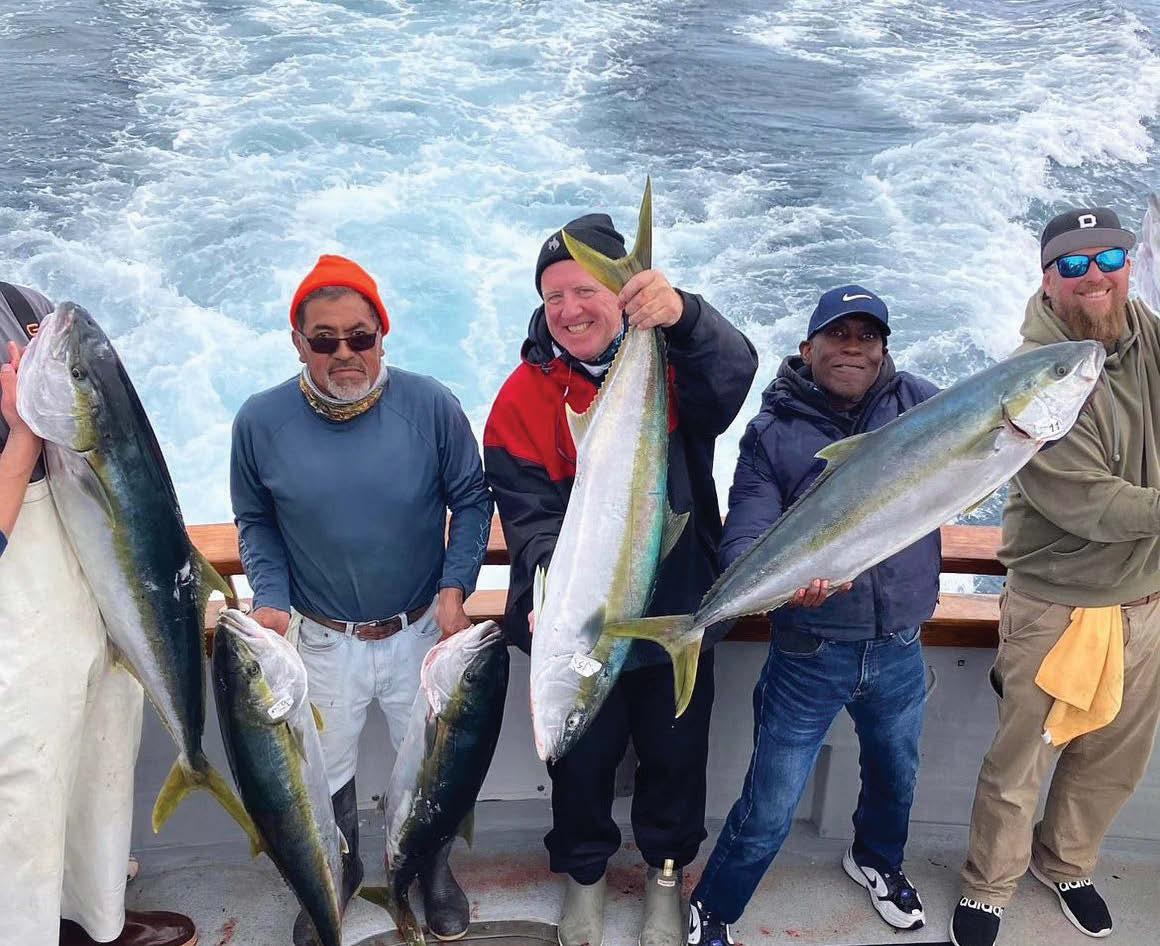
MONTEREY— On April 17, Oceana and Turtle Island Restoration Network (TIRN) published a report that discovered the set gillnet fishery targeting California halibut and white seabass off the coast of Southern California is a threat to the health and diversity of the ocean’s ecosystem. In addition, it has been discovered that the fishery throws 64 percent of the animals caught overboard, which is among the highest bycatch rates of any fishery in the country, according to Oceana.
The camouflaged nets can be as long as the Golden Gate Bridge. They randomly catch more than 125 species, including marine birds, sharks, rays, skates, a nd other fish that migrate, feed, reproduce, and contribute to the ecosystems off the coast of Southern California. Unfortunately, over half of the animals thrown overboard are already or almost dead, raising significant concerns over the fishery’s impact on California’s marine biodiversity.
“ The set gillnet fishery targeting California halibut and white seabass is clearly a risk to the health and resilience of California’s oceans,” said Caitlynn Birch, Pacific marine scientist with Oceana, in a
press release from April 17. “These nets injure and kill a myriad of ocean animals, including rare and vulnerable species. Despite a history of wildlife impacts and action by California voters, the fishery remains largely unmonitored as these nets continue to hurt wildlife off Southern California.”
Oceana and TIRN conducted an analysis, and the results are as follows:
· 75 percent of sharks, skates, and rays that are caught are tossed overboard. These species are essential in marine ecosystems and vulnerable to overfishing.
· Set gillnets are the primary threat to juvenile great white sharks in their nursery grounds off California. White sharks play an important ecosystem role, and their population is still low.
· Gray whales and federally threatened and endangered populations of humpback whales are susceptible to entanglement in set gillnets.
· More California sea lions are killed annually by set gillnets than all other observed West Coast fisheries combined.
· Set gillnets throw back as waste dead commercial and recreational fish species — such as damaged and undersized California halibut, rock crab, sand bass, and l ingcod — which can harm struggling populations and impact other recreation-


al and commercial fisheries. Management tools have been created to reduce bycatch in California, yet hook and line fishing methods remain the most selective and well-established method in the fishing industry. As a result, the California Department of Fish and Wildlife (CDFW) prioritized the set gillnet fishery as t he first state-managed fishery that requires action to address its risk to the ecosystem. Oceana, TIRN, other conservation groups, marine mammal rescue centers, recreational fishing organizations, and businesses are calling on the California Fish and Game Commission — the managing authority — to reduce the “needless waste” set gillnets inflict on California’s ocean life in accordance with state law.
A set gillnet is attached to two poles fixed in the substrate or an anchor system to prevent net movement. California set gillnets were banned in Northern California in 1915, but after Southern Californian sport fishermen saw a significant decline in fish populations in the 1980’s fishermen, environmental organizations, and elected officials worked to address the wildlife impacts that set gillnets were causing. As a result, Prop 132 was passed
by voters in 1990, prohibiting the use of gillnets within state waters 0-3 miles off the coast of Southern California. Still, in the late 1990s, scientists found that gillnets were killing an alarming number of marine mammals and seabirds. The California Fish and Game Commission then decided to ban the use of these nets off the Central California Coast in 2002. Unfortunately, due to the complexities of these various actions, most Californians are unaware that while set gillnets are banned in state waters off the Southern California mainland (0-3 nautical miles), they are still being used in federal waters, offshore banks, and in certain areas around S outhern California’s Channel Islands, causing immense damage to wildlife.
For more information, visit https:// usa.oceana.org/.
The key function of polarized sunglasses is to reduce the glare from the sun, but they can also make colors appear more vibrant, increase contrast, and even reduce symptoms of eye strain. So they help you better see fish in the water and protect your eyes from harmful UV rays, especially since summer is around the corner and fishing is a popular outdoor activity.
Glares and reflections are a problem for fishermen as they help hide the fish beneath the water, making them impossible to see. While there are different types of glares, when out on the water, anglers will experience reflection glares, a glare
resulting from reflections of high luminance in polished or glossy surfaces on a field of view. These glares are a major deterrent and can affect your vision, so
whether you’re fishing from the dock or surrounded by water, you can quickly strain your eyes and lose your catch.
To filter polarized light, manufacturers place a long chain of molecules called hydrocarbons onto a thin polyvinyl acetate film. The film is then heated and stretched, forcing the molecules to align end to end or become polarized. The film is then dipped i nto a solution containing a conducting molecule such as iodine. This chemical treatment is applied in a vertical pattern that helps filter out the horizontal light to eliminate g lares. By blocking the horizontal light
from passing through the lens, anglers will experience greater visual clarity and contrast, allowing them to see through the water’s surface and reducing eye strain and squinting for a more comfortable fishing experience.
A fter breaking down the science of it all, yes— polarized sunglasses do actually help you see fish clearer. By blocking out the blinding glare created by the w ater’s surface, you’re using a filter to look past the glare and see through the water more clearly. In addition to filtering out glare, polarization also helps to enhance definition and contrast so that you can make out details with better visual understanding.

• We are solidly into the spring fishing season and Southern California anglers continue to find a mix of bluefin tuna, yellowtail and bonito biting in offshore waters. The fishing along the San Diego County coast and at Los Coronado Islands has been very good for an assortment of rockfish species but has yet to produce much in the way of surface fishing species such as calico bass, barracuda, bonito and yellowtail.
• San Diego area anglers continue to see the water temperature warm into the 60-to-63-degree range after a winter that brought many storms that resulted in cold water

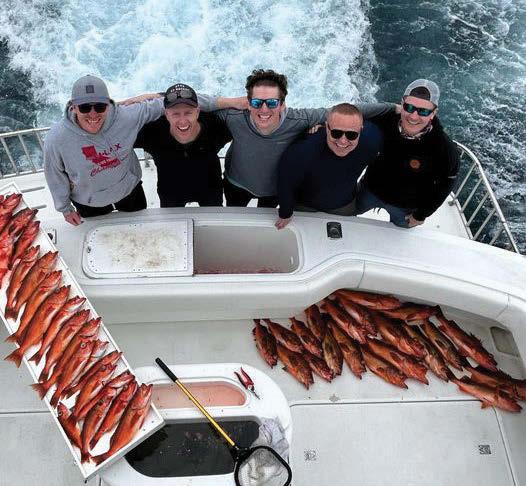
From page 12
In addition to wearing polarized sunglasses, anglers should also consider coordinating lens color as an option, just as they would their lures. Glasses with tinted lenses enhance performance by selectively filtering light rays. A gray lens filters all light colors equally, so all hues look their natural shade, whereas dark gray lenses are good all-purpose sunglasses because they best eliminate glare on bright, sunny days and show true colors. Brown,

temperatures that got down into the low 50’s. The early spring also saw areas of dirty water red tide conditions develop along the San Diego County coast and at Los Coronado Islands and as the water continues to both warm up and clean up anglers expect to see the development of better surface fishing along the coast, at Los Coronado Islands and offshore.
• The past week or so of bluefin tuna fishing has seen what had been a good bite on 20 to 160-plus pound bluefin tuna turn just fair but there have been good numbers of 5 to 15 pound kelp-paddy yellowtail biting along with some 6 to 10 pound bonito to help pick up the
green and yellow lenses serve specific functions for anglers as these tints enhance some colors while they bleach others out. For example, a sight angler who fishes by watching and trying to coax the fish to take the bait wants a tint that will enhance the colors of bass and bleach out the surrounding colors, thus enhancing the contrast between the two. Lastly, yellow lenses heighten contrast but aren’t d ark enough to provide maximum polarization, making them a better fit for s ight fishing in shallow water on overcast, dark days.
slack. What has also been helping to boost recent catches on some of the offshore tuna trips is that some trips will make a stop at the 60 Mile Bank to do some fishing for rockfish. The rockfish fishing at the 60 Mile Bank has been excellent. Good news about the tuna fishing is that there are still lots of bluefin being found spread over a wide area that could bunch up and once again start biting better at any time.
• Best areas for the bluefin have been within 45 miles or so of Point Loma in the regions of the Upper Hidden Bank, 371 Bank, 425 Bank, 230 Spot, 224 Spot, the Corner, the San Clemente Basin Weather Buoy, the northern wing tip of the Butterfly Bank and the San Salvador Knoll.

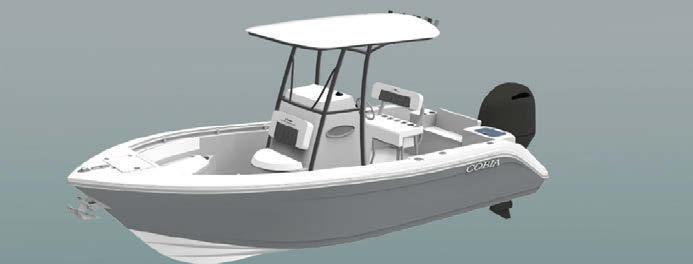
Full story will be found online. Bob Vanian is the voice, writer, and researcher of the San Diego-based internet fish report service called





976-Bite which can be found at www.976bite.com. Vanian also provides anglers with a personal fish report service over the telephone at (619) 226-8218. He always welcomes your fish reports at that same phone number or at bob976bite@aol.com.
Solution from CROSSWORD,

“The @boardroomfishing and Capt Todd Mansur hit the 14 Mile bank over the weekend on a 1/2 day private charter. Good shots at fish and a successful trip! #danawharf @ danapointharbor”
For instant listing updates, follow us on social media!

BEACH (949) 574-7600

(206) 625-1580


Crow’s Nest Yachts office is independently owned and operated.

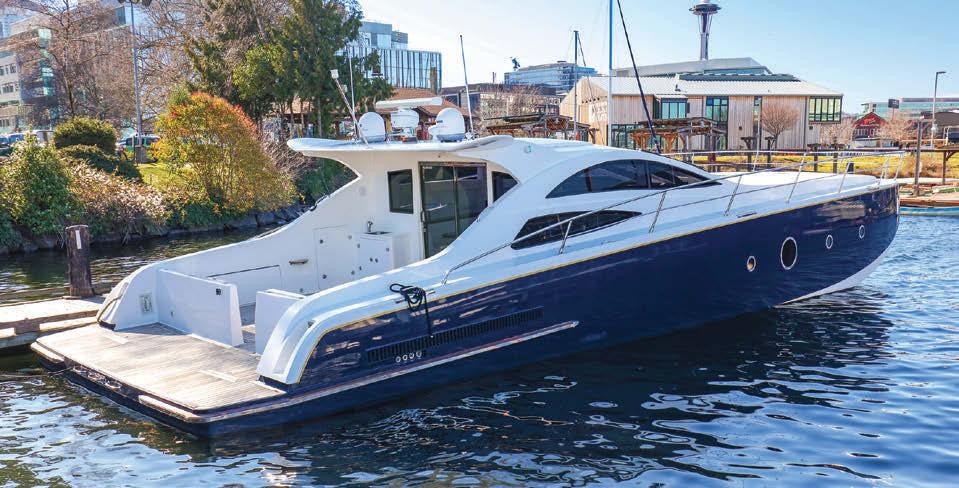

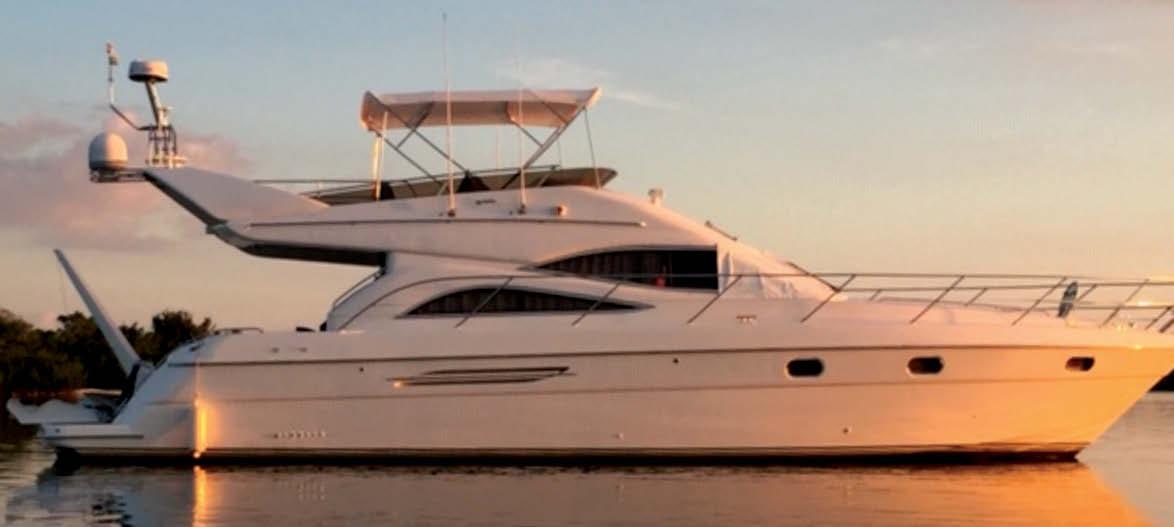
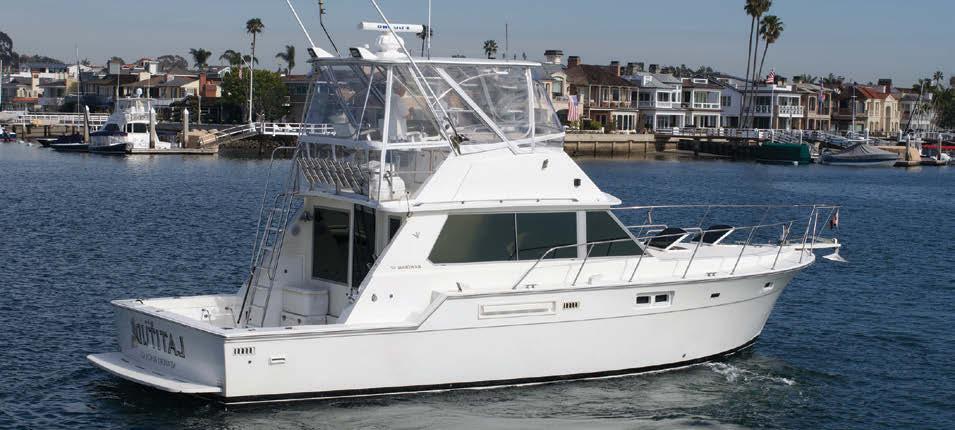


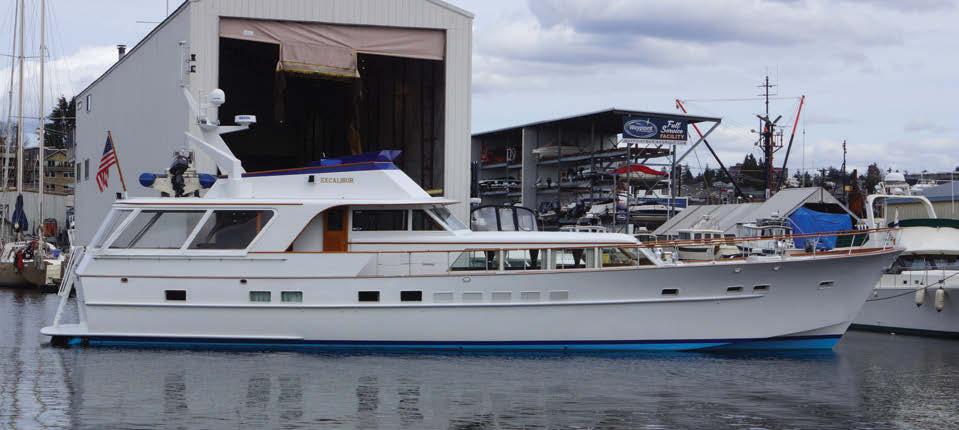
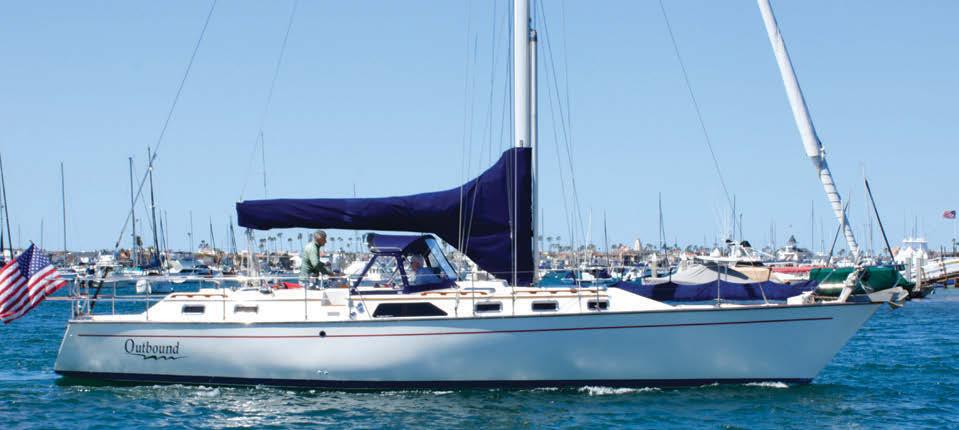



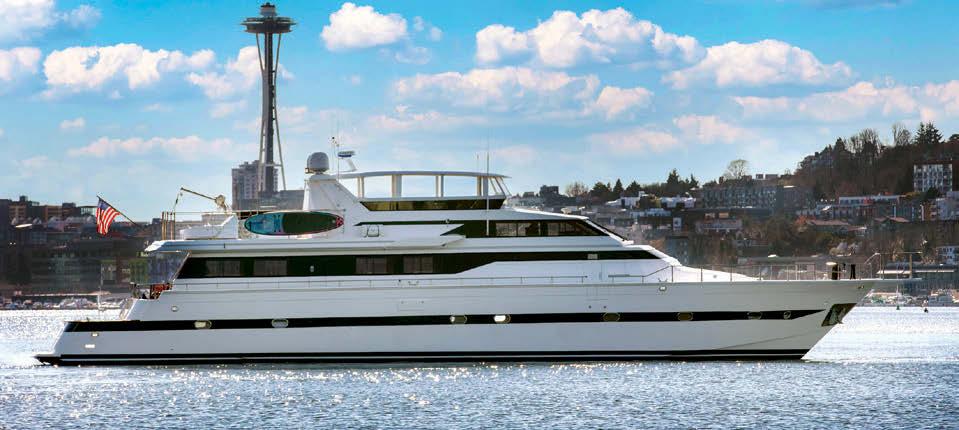

 60’ M2 POWER CAT 2007 - Twin MAN power, 2 staterooms, 2 heads, Kevlar construction, total refit of soft goods & paint, low hours. Dan Wood (206) 719-1800.
44’ MORGAN CENTER COCKPIT YACHT 1989 - Exceptional in every way! Bristol condition from stern pulpit seating, stern boarding ladder, & stainless rails... Bob Steel (949) 422-2633.
58’ WEST BAY SONSHIP 2001 - 3 double cabins, 2 heads, 3 control stations, upgraded engines CAT 3406Es 800hp each, many upgrades in 2021. Dennis Riehl (949) 697-4120.
52’ MIDNIGHT LACE 2005 - Twin CAT C-9, heat/ac, Webasto, watermaker, custom paint, TNT lift, new full enclosure, boathouse kept in fresh water. Dan Wood (206) 719-1800.
83’ BURGER 1967 - Once in a lifetime special vessel, kept in state of the art boathouse, cared for by knowledgeable yachtsman, fresh paint. Dan Wood (206) 719-1800.
98’ VERSILCRAFT SUPER CHALLENGER 1987 - MARAD waiver. Captain-maintained full-time, constantly upgraded, 3 MAN 2842 LE engines. Dan Wood (206) 719-1800.
42’ SABRE EXPRESS 2017 - Bristol condition, a rare find on the west coast, very well equipped with twin Volvo IPS 500s, LLC owned. Steve Besozzi (949) 355-4644.
38’ VAN DAM 2003 - Major refit in 2021, new paint on deck, bottom, & hard top, Honduran mahogany sanded to raw before new stain & clear coat. Dan Wood (206) 719-1800.
78’ WEST BAY SONSHIP 2005 - 2nd owner, very clean, loaded w/ options incl. ABT Zero Speed stabilization, hydraulic bow & stern thrusters. Michael Gardella (619) 540-4444.
48’ HATTERAS MOTORYACHT 1981 - Live aboard moorage available, 3 staterooms, huge aft stateroom & aft deck, 6V92 mains, new generator. Dan Wood (206) 719-1800.
42’ BERTRAM CONVERTIBLE - Asking $179,500. Major refit in the last few years! Half tower, hard top, rebuilt engines, cockpit has been painted with LP paint. Alan Baron (949) 933-2112.
60’ M2 POWER CAT 2007 - Twin MAN power, 2 staterooms, 2 heads, Kevlar construction, total refit of soft goods & paint, low hours. Dan Wood (206) 719-1800.
44’ MORGAN CENTER COCKPIT YACHT 1989 - Exceptional in every way! Bristol condition from stern pulpit seating, stern boarding ladder, & stainless rails... Bob Steel (949) 422-2633.
58’ WEST BAY SONSHIP 2001 - 3 double cabins, 2 heads, 3 control stations, upgraded engines CAT 3406Es 800hp each, many upgrades in 2021. Dennis Riehl (949) 697-4120.
52’ MIDNIGHT LACE 2005 - Twin CAT C-9, heat/ac, Webasto, watermaker, custom paint, TNT lift, new full enclosure, boathouse kept in fresh water. Dan Wood (206) 719-1800.
83’ BURGER 1967 - Once in a lifetime special vessel, kept in state of the art boathouse, cared for by knowledgeable yachtsman, fresh paint. Dan Wood (206) 719-1800.
98’ VERSILCRAFT SUPER CHALLENGER 1987 - MARAD waiver. Captain-maintained full-time, constantly upgraded, 3 MAN 2842 LE engines. Dan Wood (206) 719-1800.
42’ SABRE EXPRESS 2017 - Bristol condition, a rare find on the west coast, very well equipped with twin Volvo IPS 500s, LLC owned. Steve Besozzi (949) 355-4644.
38’ VAN DAM 2003 - Major refit in 2021, new paint on deck, bottom, & hard top, Honduran mahogany sanded to raw before new stain & clear coat. Dan Wood (206) 719-1800.
78’ WEST BAY SONSHIP 2005 - 2nd owner, very clean, loaded w/ options incl. ABT Zero Speed stabilization, hydraulic bow & stern thrusters. Michael Gardella (619) 540-4444.
48’ HATTERAS MOTORYACHT 1981 - Live aboard moorage available, 3 staterooms, huge aft stateroom & aft deck, 6V92 mains, new generator. Dan Wood (206) 719-1800.
42’ BERTRAM CONVERTIBLE - Asking $179,500. Major refit in the last few years! Half tower, hard top, rebuilt engines, cockpit has been painted with LP paint. Alan Baron (949) 933-2112.



















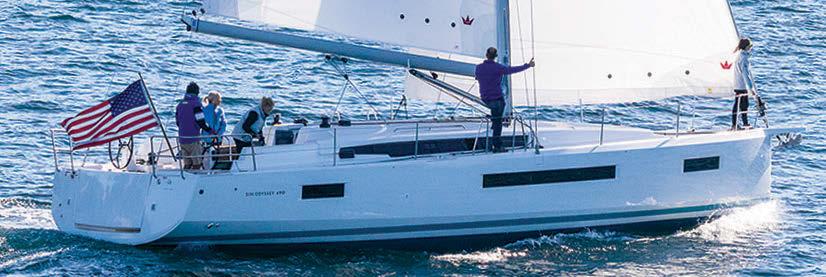





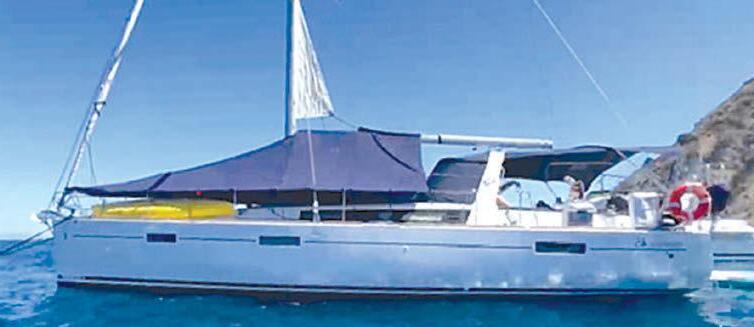







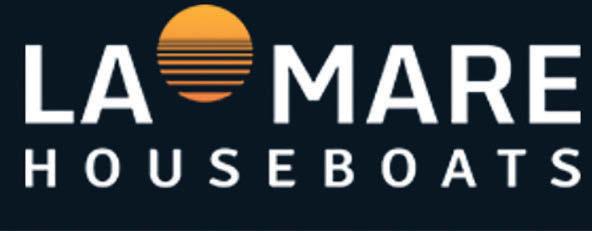

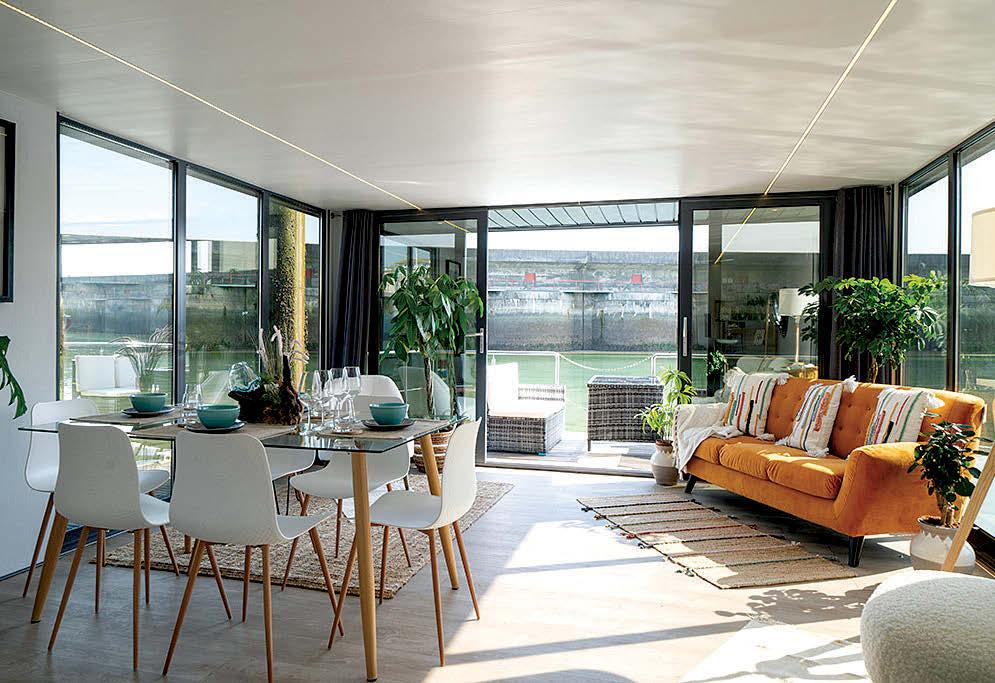
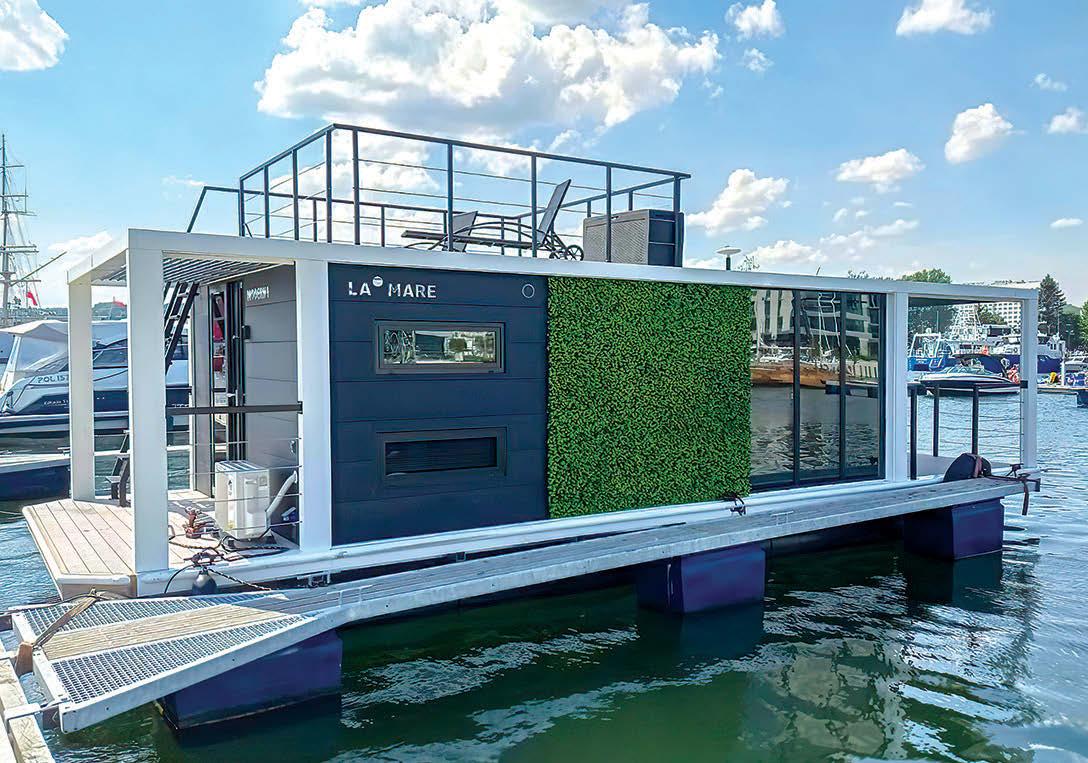







Whether you’re a seasoned boater or just starting out, our experienced staff can help you find the perfect engine for your needs. So don’t wait – come down to our showroom today and take advantage of our unbeatable selection, prices, and service!
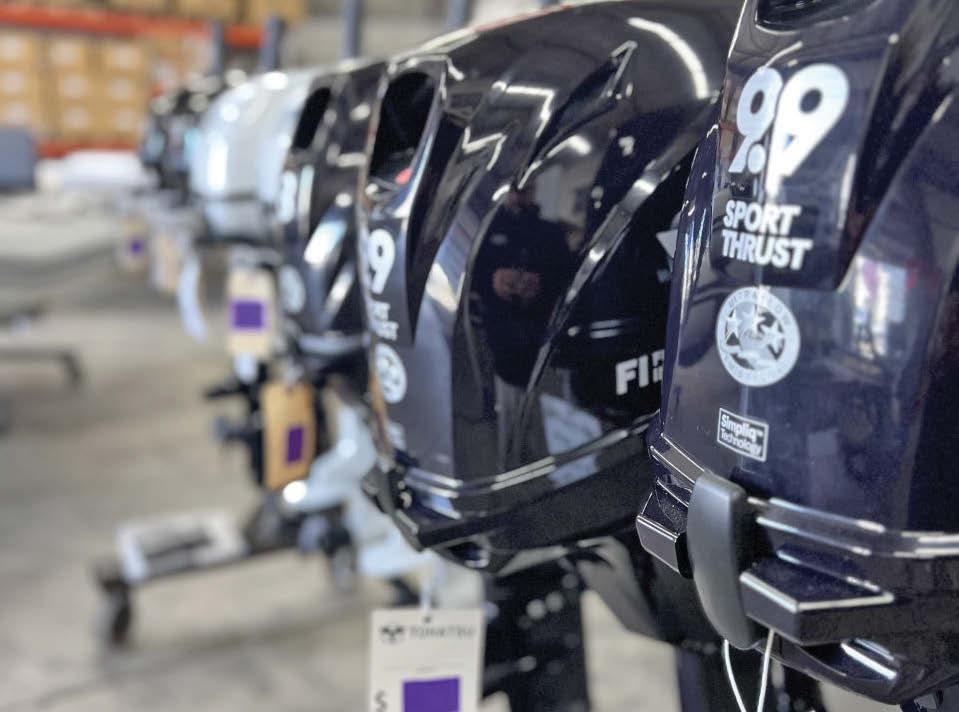



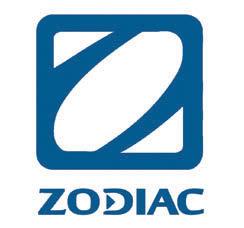




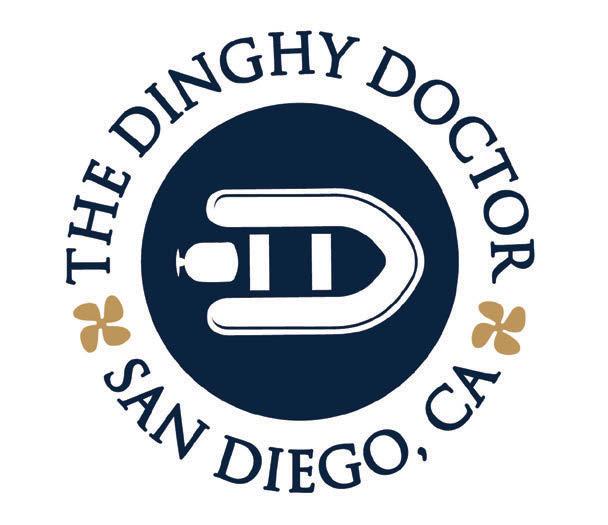
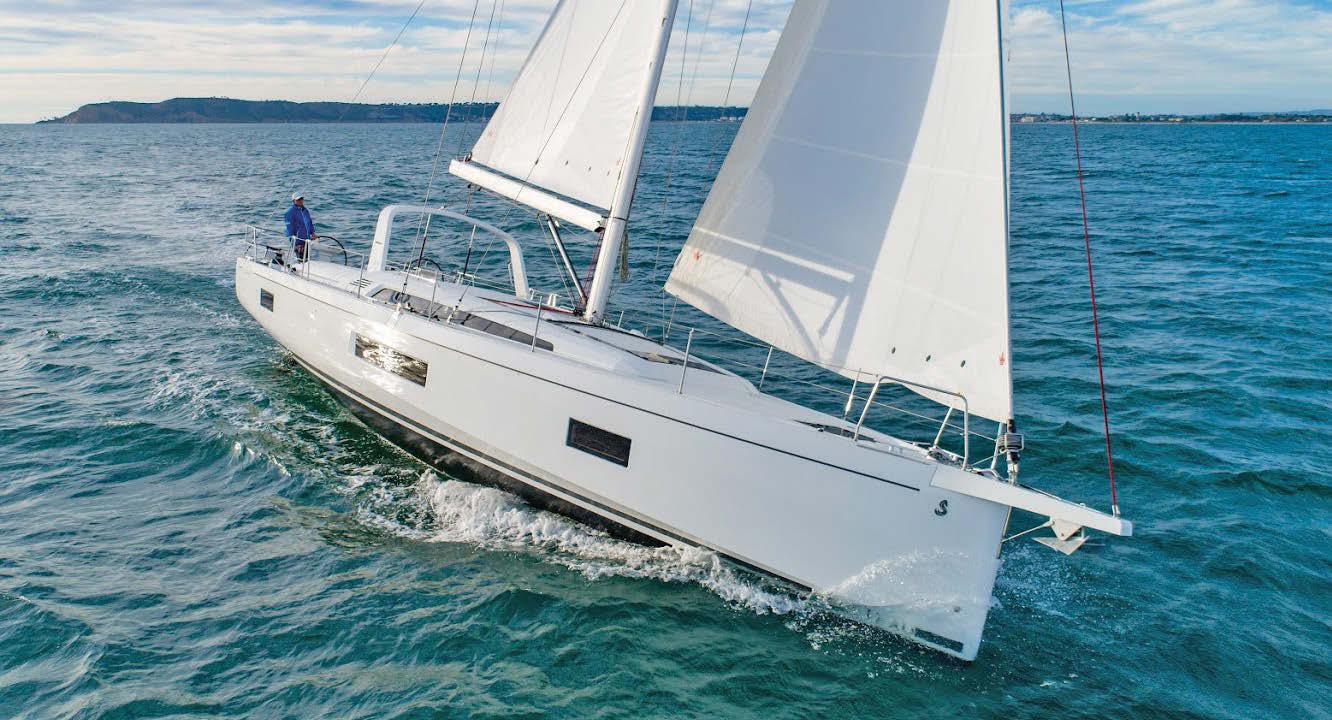








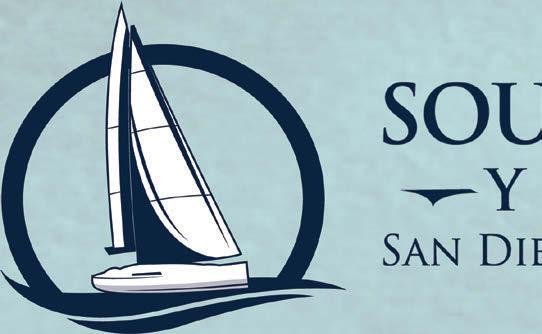
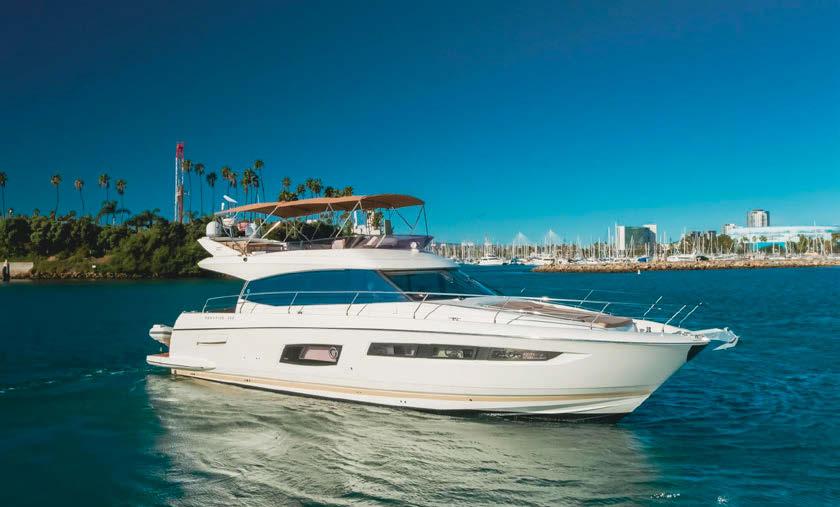

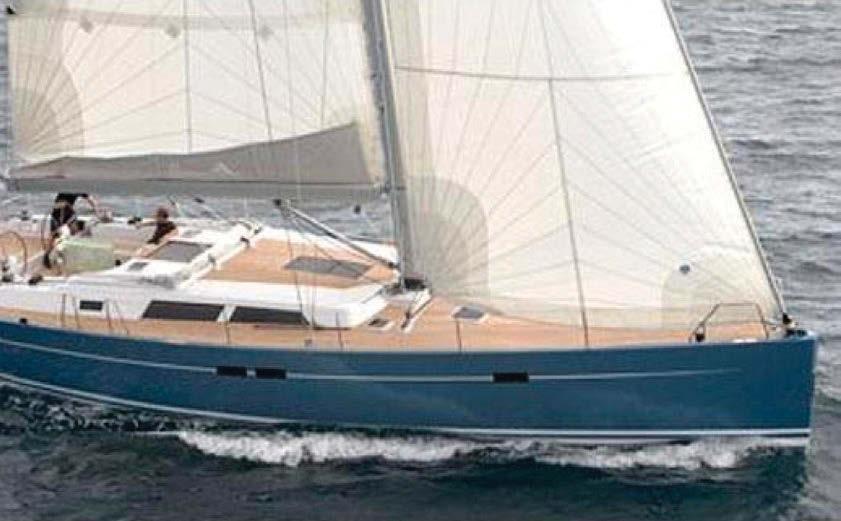

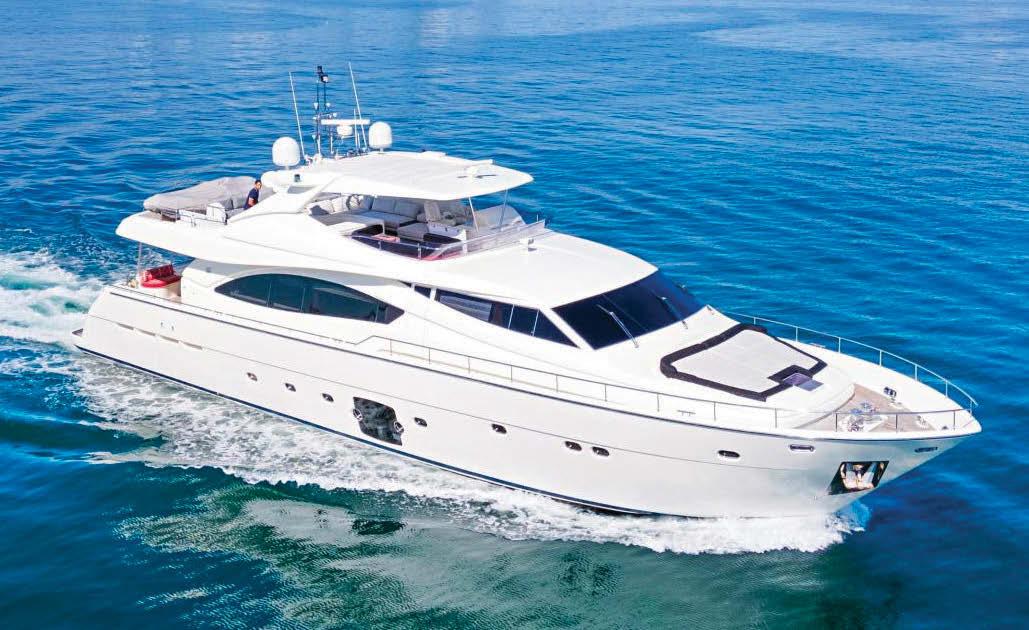




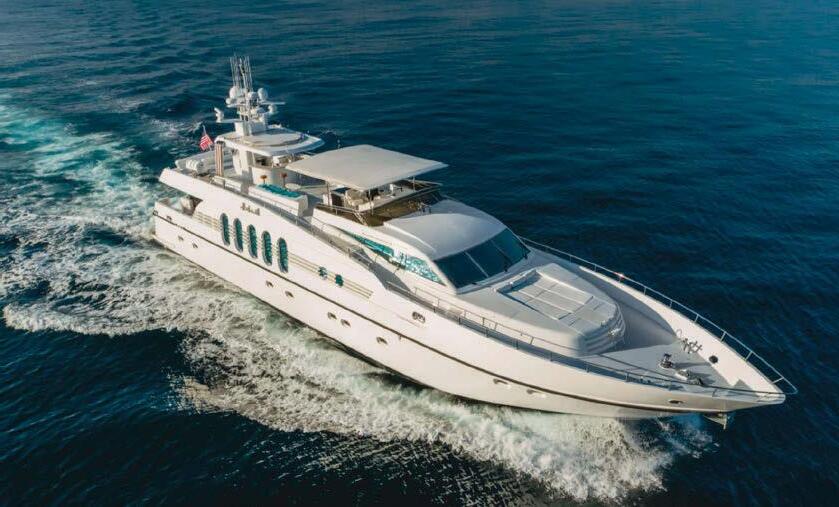





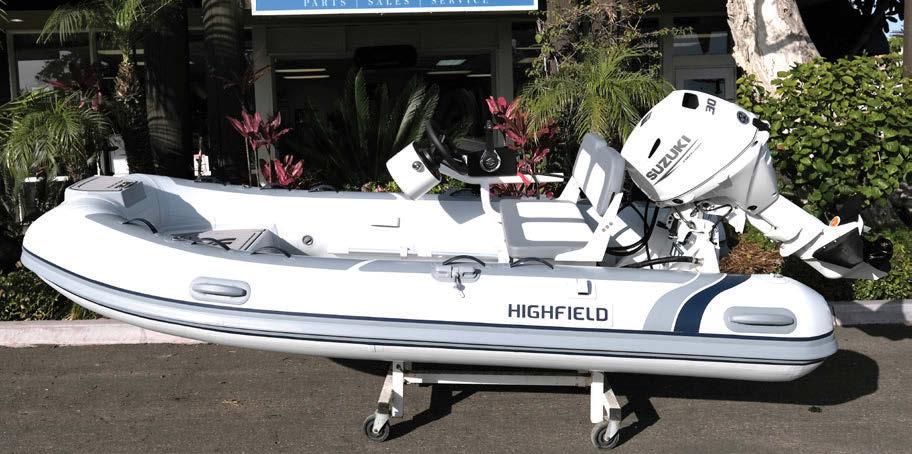




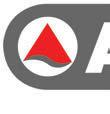


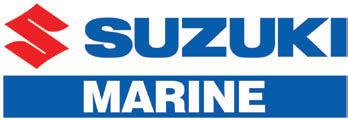




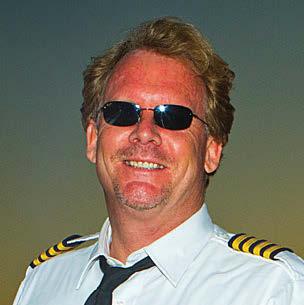




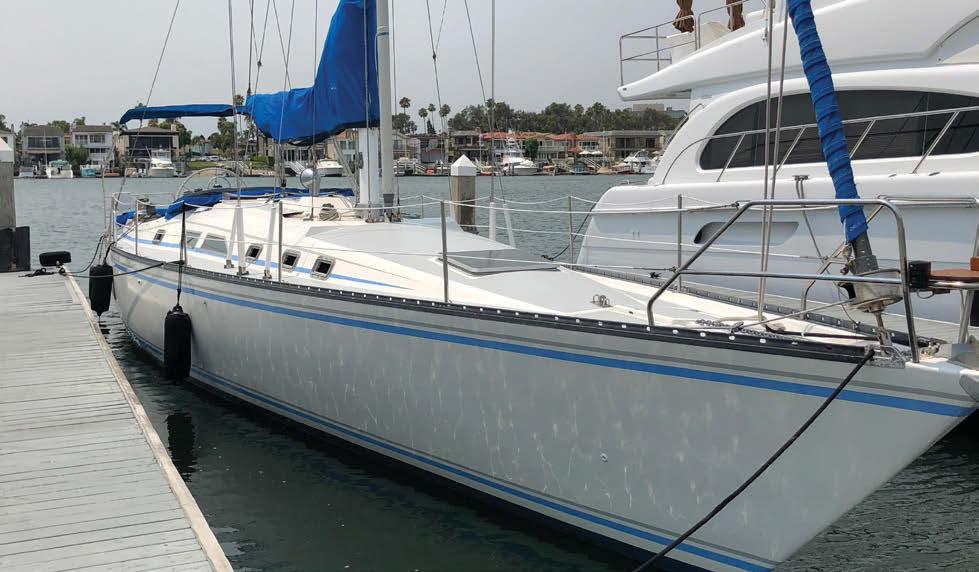
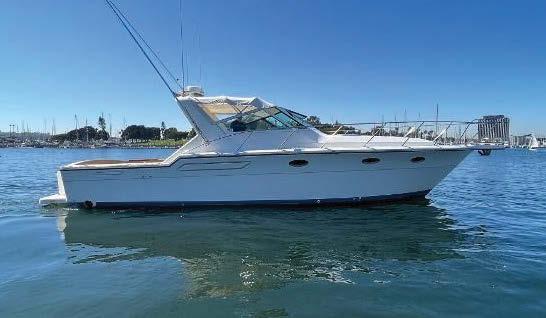








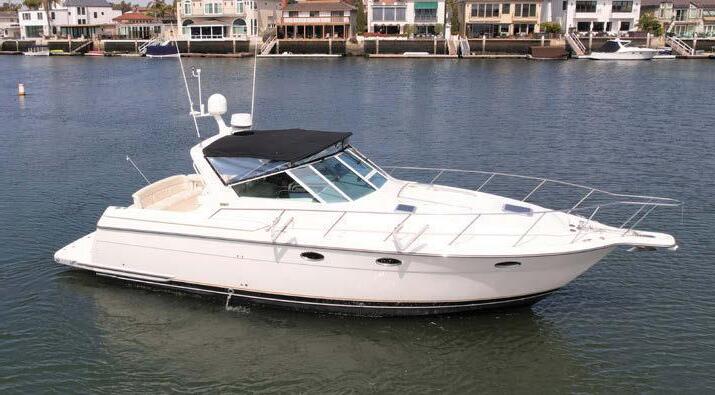
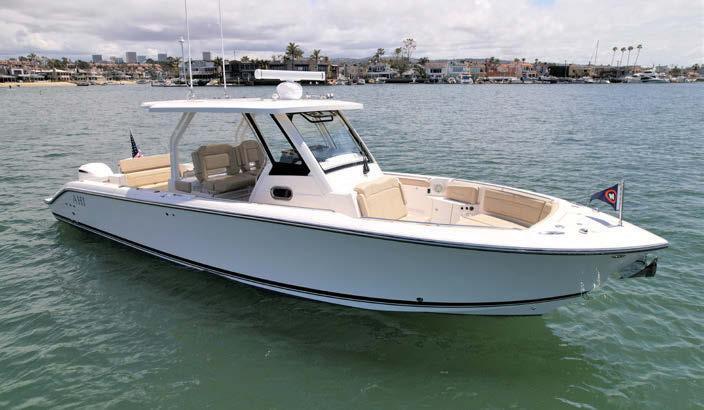

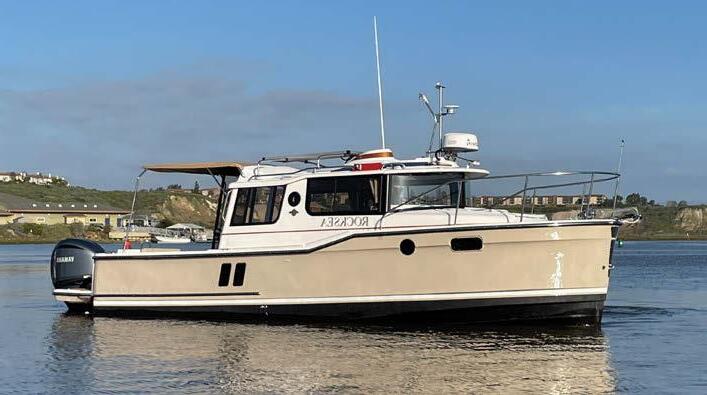

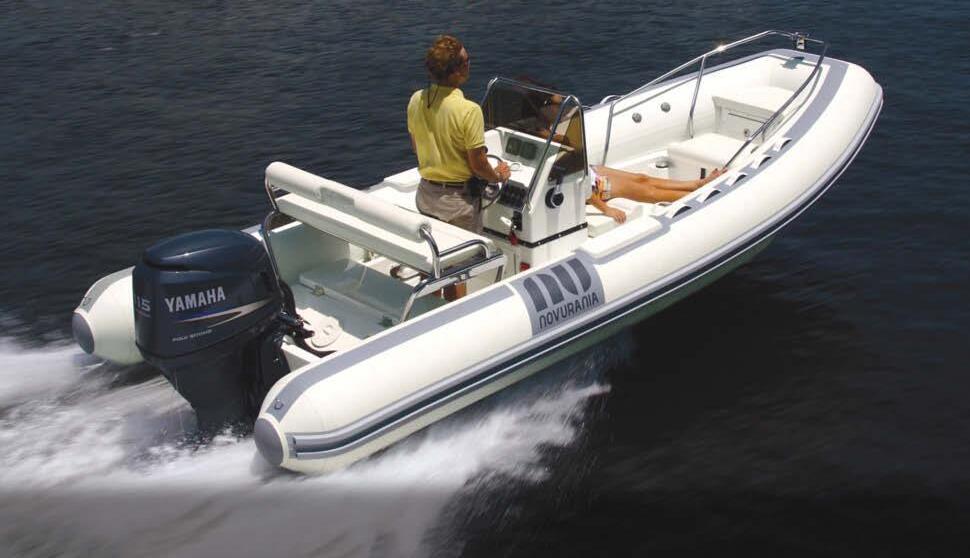


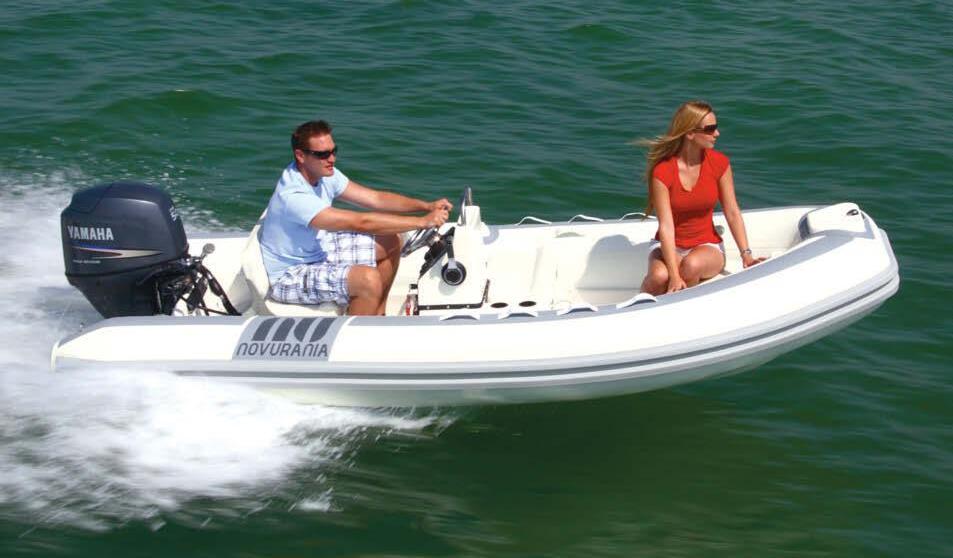


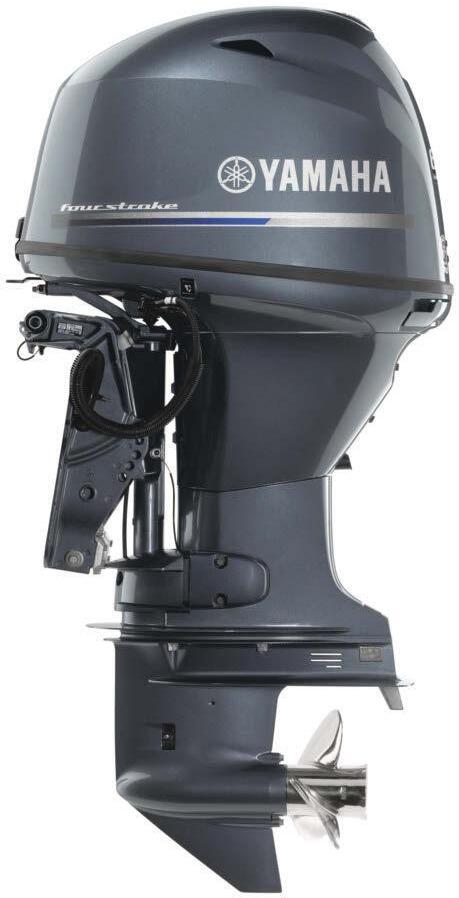








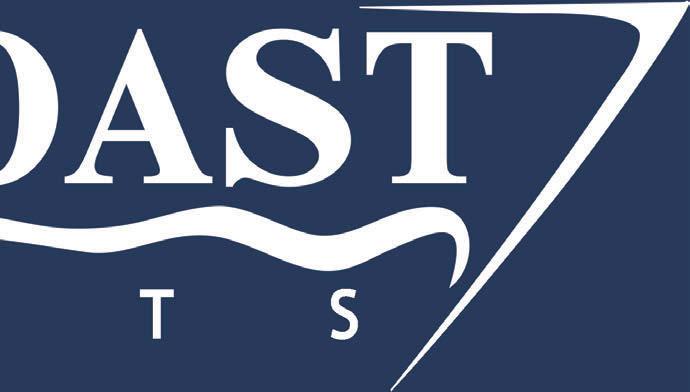
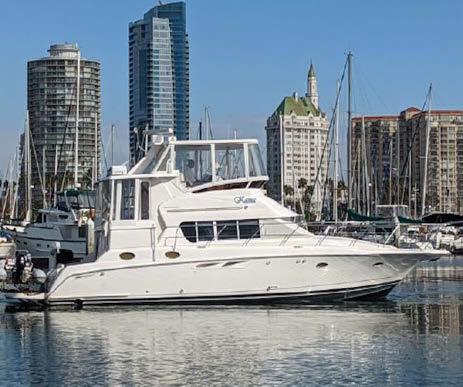
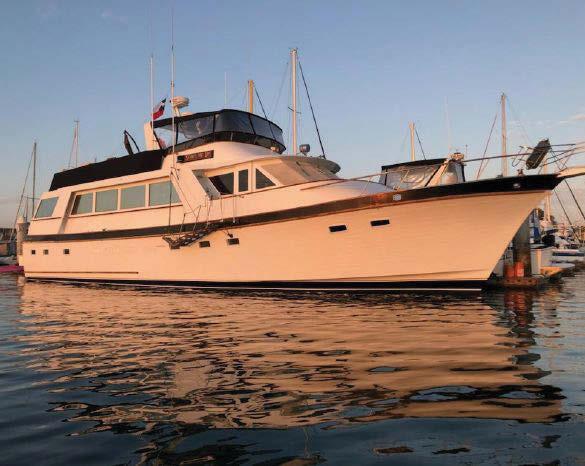



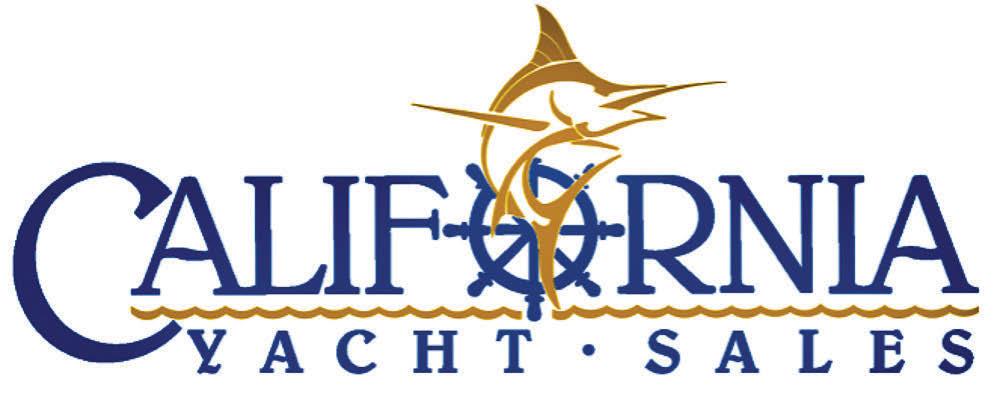










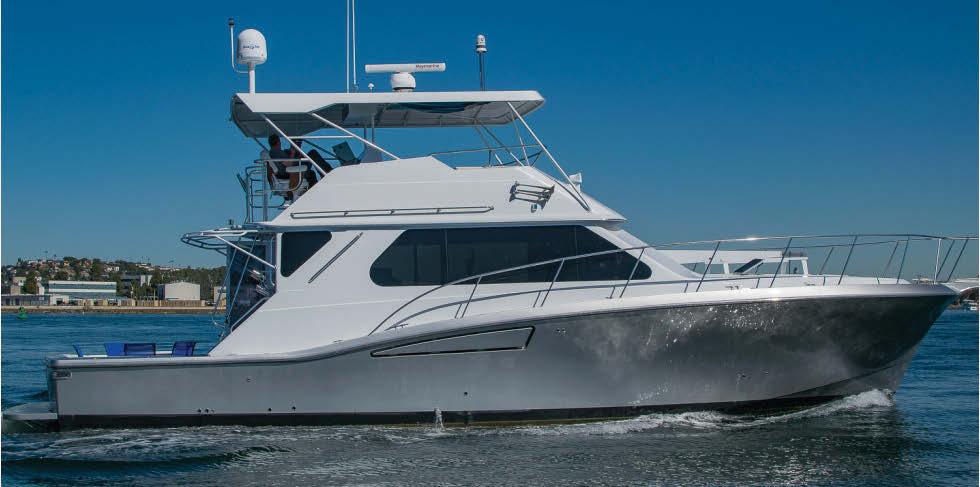















































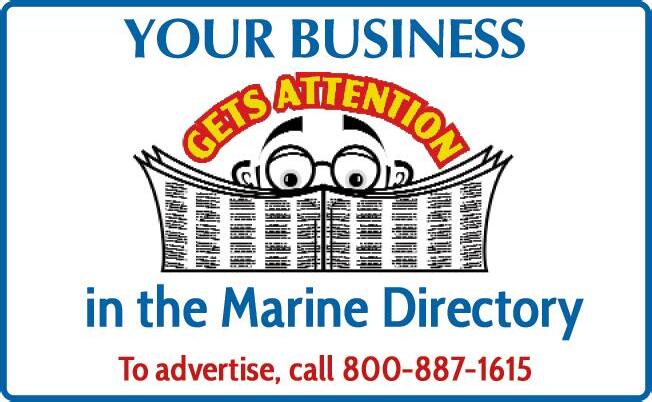















10’CARIBE: Inexcellentcondition.Brandnew Tohatsu6horsepowerfour-strokeoutboardwith 4yearwarranty.Neverused.Customcover. Bottompaint.$2,750.Call310-351-3522.


DeepV,seats7,150hpYamahaoutboard with140hours.Garmin,stereo,marine radio,Pacifictrailer,newtires,lookslike new.Greatoceanboat.$27,500. Bryan:909-240-2642
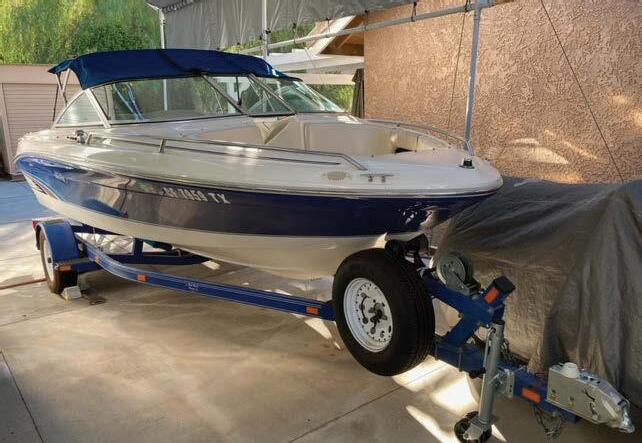


14’VINTAGEGLASSPAR1956: Needssome TLC.Needsmotor.KeptinGroverBeach.Has trailer.Haspinkslip.Currentregistration. $1,950.805-234-4991, captainscott100@gmail.com

12’CARIBE2003
Beautiful!40hp4-strokeHonda,low hours.Looksandrunsgreat!$10,500. SportPortfloatavailable,$1,000.Long Beachsliprentalavailable. Gary:562-209-5693, garylevine@verizon.net
13’1”AVONSEASPORT380DLTENDER: 135 hrs.Yamaha50hpserviced@135hours. FusionBT4speakers.includestendercover. Oneowner,newin2019.Excellentcondition. $25,500.Call949-922-3101


20’SKIPJACKOPENCRUISER,1984: 650 hours.Inoriginalcondition.Trailer.LongBeach slippossiblewithmarinaapproval.$14,900. Privateparty:323-715-7062
Excellentconditionandwelllookedafter. Boathousekeptuntil2019.TwinVolvo dieselsRecentlytraileredtoSanDiego. Recentsurvey.$145,000. ContactJackson:920-819-8049, jackson@wsyachtbrokers.com

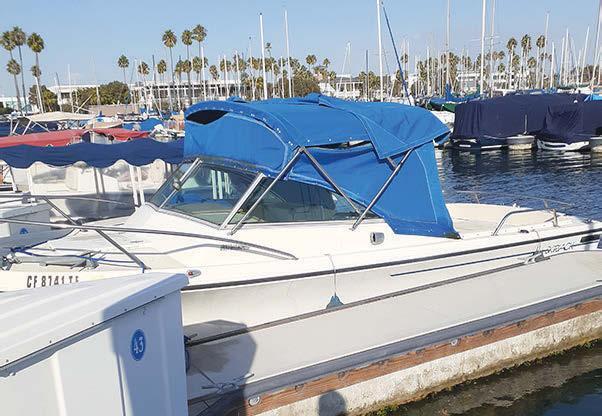
23’RANGERTUGR232016
Excellentcraftsmanship.Excellent condition.With200hpYamahaoutboard. Includestrailerwithdiscbrakes.Redondo slipavailablewithapproval.$119,000. ShorelineYachtGroup,Jack:323-422-8966, jack@shorelineredondo.com

30’CRUISERS2980ESPRIT1989: Dual-Helm Sportfisherw/twin270HPCrusaders.20MPH+, (2)100gfuel,45gwater,chart-plotter,VHF, windlass,bait-tank.Sleeps6.$41,500. ShorelineMarina,LB.Capt.Mase: 562-494-3885, Maesonic@msn.com

30’MAINSHIPPILOT2000

Extras.$14,500.661-644-5894.


27’SEARAYAMBERJACK2005
BoatisaMUSTsee!Maintainedbyan experiencedowner.Newengine!Bottom paint12/2022.$69,900.SeacoastYachts, DanielleLord,562-213-2900 dani@seacoastyachts.com
Seriousprideofownership.Economical4-cyl Yanmardiesel,fullcanvasandglass,great electronics.Fullyservicedandready. $59,000.ContactBobNorlandSeacoast Yacht:s714-493-9214 bnorland@seacoastyachts.com
CLASSICBERTRAM31: Twin454Mercsrun great!Lotsofupgrades.$59,900.40’mooringis alsoavailable.Call949-706-4369.


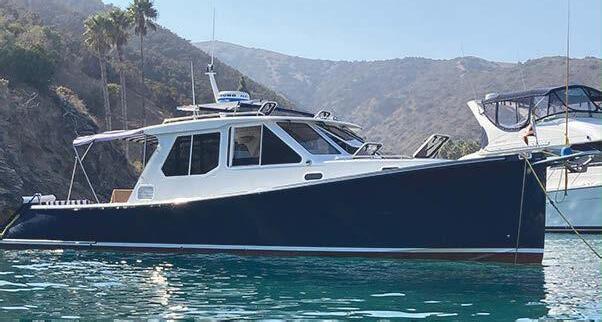
EXCEPTIONAL33’OUTRAGE2017
on2019EZthreeaxletrailer.Twin350L6 Mercswithonly148hours.Joystick.Self Levelingtabs.15”RaymarineElectronics NavigationPackage.Radar.Manymore options.Fulllistuponrequest.Locatedin BellinghamWA.Readytogo!$334,000. CallLes:206-948-0921
37’SEARAY1995
Verycleanandreadyforsummer!Newer canvas.Auto-pilot,air-conditioing,radar, generator.$79,900.ContacttheListing BrokerCaptTimHagenat714-926-6775or timh@seaacoastyachts.com

40’BAYLINER4087ACMY1996

Beautifulanduniquethreestateroom design.Excellentconditionwithone exception,gensetiscurrentlynot working.$109,000.ShorelineYachtGroup, Nick:310-748-5409, yachtbroker@pacbell.net
31’CAMANOTROLL2003
Meticulouslymaintained.Verylowhours. Fuelcapacity100g,200hpVolvodiesel. Recentsurveyavailable.Manyamenities. PossibleadditionalsaleofNewport Harbormooringandtender.$134,000. 949-375-0958
Withlowhours.Ownersparedno expenseinkeepingtheboatintop condition.Turn-keyandreadyforthe island.$124,000.ChristopherPeters, SeacoastYachts:714-379-7797
31’FORMULAPC2004
Cleanandwellmaintained.TwinVolvo 8.1Lmotors,lowhours,sterndrives,AC& generator.Price:$74,900. SeacoastYachts,JimDragomir, 562-253-4687 jim@seacoastyachts.com
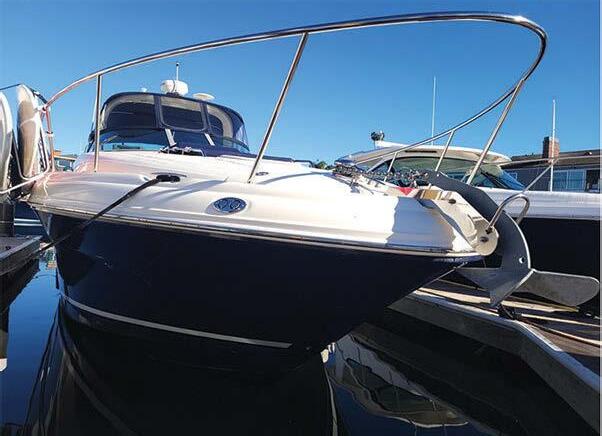

GreatweekendCatalinacruiserand coastalfisherman’sdelight.Updated electronicsandwindlass.Veryclean interior.Pricedtosellat$29,900. ShorelineYachtGroup,Bill:949-466-2206, mrforsythe@hotmail.com


So.California’sBoatingNewspaper. 1-800-887-1615



“CarrieEllen”isa37’ExpressCruiserand ishandsdownthefinestboatofherstyle andvintageonthemarket.Sheisin immaculateconditionandhasmajor upgradesrarelyfound.Theprevious ownersparednoexpenserefittingher withnewMercrusierHorizon8.1engines (2015)andnewKohler7.5EKDGenerator in2019.Theseupgradesalonetotalover $50,000!overthetimeperiodof2015to 2019otherupgradesincludenew upholsterythroughoutthecockpitand salon,newelectronicsandallnew instruments.Her12’beamprovidesa greatstablerideatseaandalongwithher fullcamperbackenclosuresheis comfortableforaweekendatthedockor aweekendatCatalina.$83,400. ShorelineYachtGroup-Steven 310-720-6999, Steven@dragonandrat.com
Turn-key,noadditionalexpense necessary.LOL46’,lowhours.1446 Cummins6BTA5.9,manyupgradeswith receipts.Greatliveaboardorforfishing, etc.$CALL$. Johnny@BarnacleFlush.com, 619-732-6287.
38’TRUENORTHDOWNEAST: Partial ownershipLLCowned.DockednexttoBalboa YachtClub.PerfectweekendCatalinaboat. Professionallyupgraded,managed& maintained.Truehassle-freeownership.VIP service.$40,000.310-529-0491
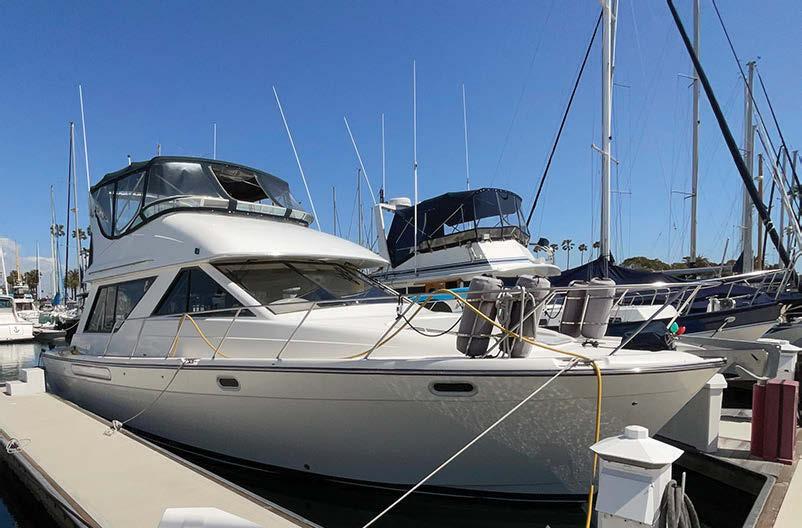
Popularfortournamentfishingandfamily fin.Exceptionalseakeepingabilities, superbfishability,long-rangeandquality constructionmergetogether.REDUCED! $115,000.ShorelineYachtGroup,Jack: 323-422-8966, jack@shorelineredondo.com
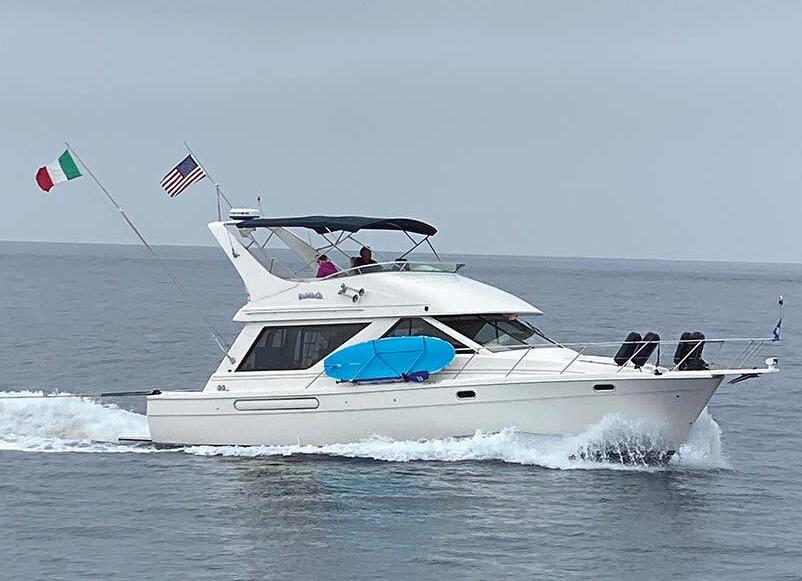

LocatedNewportBeach,ca.$699,000. Freshwatervesseluntil18monthsago. 400hoursonVolvoIPSD6Diesels. CallortextKoryat801-550-2528.
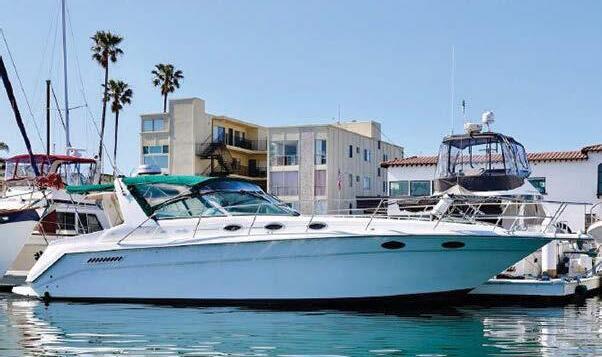

COMMANDBRIDGE2001
2stateroom,2headpracticallayout. Insidehelm,galleyup,dinetteandsalon table,330HPTwinCumminsdiesel.LLC OWNED.$148,000.702-292-1851, joanniewilliamslv@gmail.com
POWERBOATS
TOPLACEANAD,Call800-887-1615,oronlineat thelogclassifieds.com


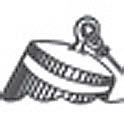
(310) 514-4985 cabrilloway@westrec.com
28’-130’ SLIPS AVAILABLE!
End-Ties available for Catamarans. Beautiful New Marina! Shortest Run to Catalina!

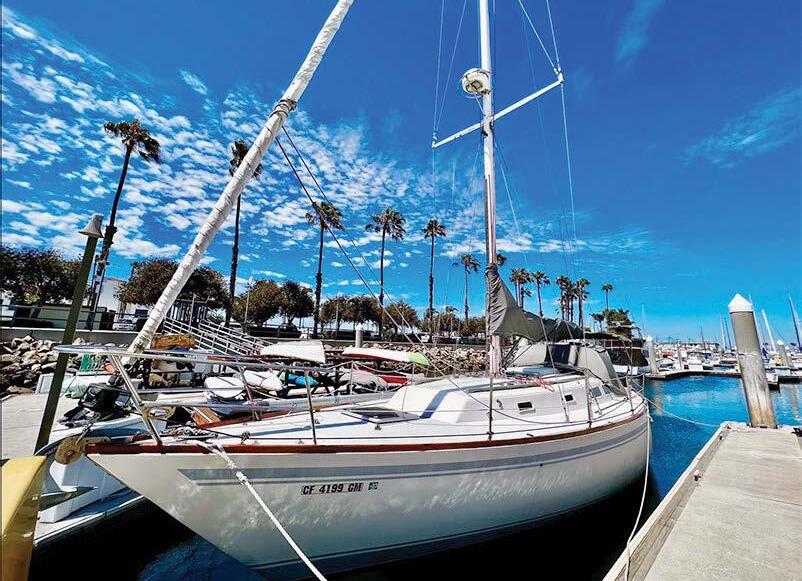



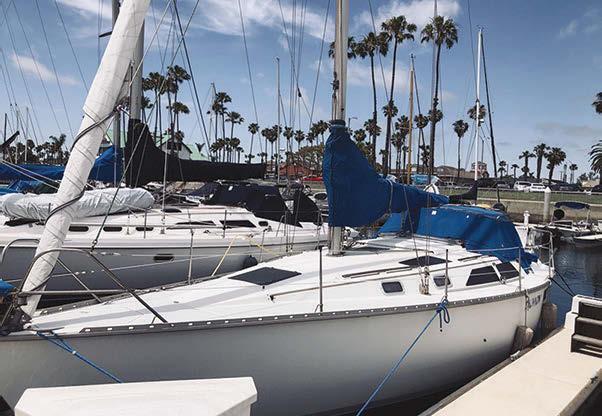
ARAREOPPORTUNITY

tobuyaoneowner,professionally maintainedBOSTONWHALEROutrage
21.Arguablythecleaneset,best maintaintedOutrage21ontheWest Coast.LowtimeYamaha225HPfour stroke.$49,850.928-300-3423
BOATSWANTED
Letussellyourboat!Wehavethe expertisetogettheresultsyoudesire. Fromattractingbuyersthroughthesale andclosing,wehaveyoucovered. Call310-748-5409
MULTI-HULLBOATS
GOODMORGANSAILOR!
34’Morgan.Allsailsingoodshape.New Genoa.Atomic-4inboard,3.5draft,sleeps six.Durablefiberglasshull.Allreceipts.. Slippossiblytransferrable.Surveyed: $14,000.Now$4,000.310-925-6555.
Withaverylonglistofupgrades
$49,500.SeacoastYachts,Sam 310-734-4208, samuel@seacoastyachts.com

50’TRI
WellsuitedforLiveaboard,Channel IslandsCharterorworld-class“comfort cruising”.Fullyequipped,professionally maintained,comfortablecruise accommodationfor12.30+yearowner. DeliveryReady!$219,000/obo. 808-630-6084, gomorrishi@gmail.com
SAILBOATS
Lotsofupgrades,xantrexcharger,xantrex batterymonitor,inverter,newerstove, electricwindless,tankmonitors,newer rigging.$27,500.
SeacoastYachts,Errol 310-818-6988, errol@seacoastyachts.com

29.5’HUNTERSAILBOAT1987


Yanmar2GMmarinediesel.Newbatteries, nicesails,wellmaintainedinside/out. Surveydone.DockedinsafeHarbor, CabrilloisleG-35,SanDiego,CA.


$9,800/OBO.805-340-1770, cgabella@gmail.com
85’CUSTOMSCHOONER1978 Verysolidworldcruiser.Pricereflects repairneedsandnavigationupgrades. Shorthandcrewcapable.Hasagreat history.$145,000. SeacoastYachts,Chuck562-455-0143 crivers@seacoastyachts.com
30’NEWPORTHARBORMOORING and30’ JensenCalsailboatpackage.Lowhourson diesel.Goodcondition.Internalleadkeel,radar, chartplotter.Mooringjustoverhauled.$39,000. 714-356-0089
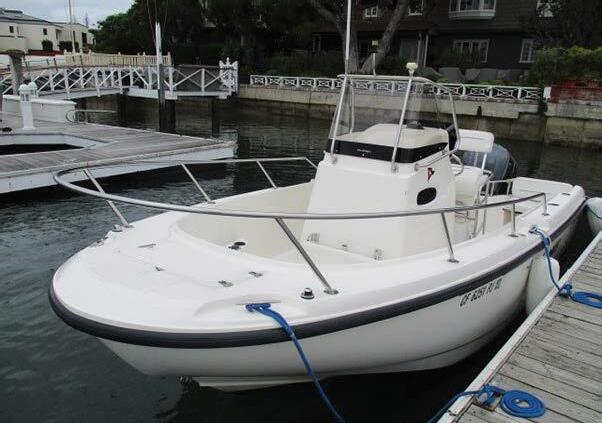
30’ SLIPS AVAILABLE
STARTING AT $11.25 PER FT Los Angels Harbor n (310)834-7113

30’ SLIPS AVAILABLE
Redondo Beach n (310)376-0431

60’ & 70’ SLIPS AVAILABLE San Pedro n (310)732-2252
TAKING RESERVATIONS
Coronado n (619)435-5203
ALLARSONMARINA
Slips&MooringsBuoysfrom25’to55’, at$10.00/ft.ClosestRuntoCatalina. Beverages&SnacksSoldinOffice. 310-832-0526or 1046larsomarina@gmail.com
AVALONMOORING
70FOOT,#247
TUCKEDINBEHINDCASINO 949244-4645• KMFINNBIC@ATT.NET
AVALON MOORINGS FOR SALE
30 ft. to 130 ft. Inside/Outside www.avalonmooringsforsale.com
310-544-4667 n 310-795-2311
BAYSIDEVILLAGEMARINA
PrimebackbaylocationinNewport Beach.Slipsandstorage. Callforavailability.949-673-1331 www.baysidevillagemarina.com
ISLANDYACHTANCHORAGE: LOS ANGELESHARBOR.25’-50’SLIPS AVAILABLE.SOMELIVEABOARD.CALL 310-830-1111.

BRANDNEWMARINA: Slips25’-75’.Private, quietharbor,closetothebeach,shopping, restaurants,parking,&more.Call714-840-5545 oremail info@huntingtonharbourmarina.com
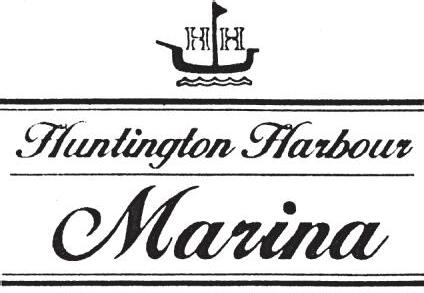
Yacht Haven Marina 310 834-6892 • www.yachthaven.org
POINTLOMAMARINA-SANDIEGO: Callfor slipavailability.Call619-718-6260oremail office@pointlomamarina.com
PUTYOURSAILBOATINTOCHARTER in DanaPointHarborwithAventuraSailing Association.Haveyourboatmakemoneywhen youaren’tusingit!Slipsavailable.949-493-9493, membershipservices@aventurasailing.com
SANDIEGOMOORINGCOMPANY: Visit our websiteforinformation&applicationwww.sandiegomooring.com orcall619-291-0916.
WANTEDMOORINGATTHEBYCMOORING FIELD: PleasecontactJoeat626-343-2823, celldirect.Willingtopurchaseandclosethe samedayThankyou.
LIGHTHOUSEYACHTMARINA: 1ST&2ND MONTH1/2OFF(WithThisAd),34’END-TIE FORCATORTRI+25’TO50’SLIPS.L.A. HARBOR.Water/electricity/dockboxincluded. Showers,laundry,parioarea.Gated,clean& quiet,lockers.Closeportto...Catalina.Berth 205-B,1300AnchorageRd,Wilmington.Call Barbara:310-834-9595. www.lighthouseyachtmarina.com.Email barbgmarina@gmail.com

LONGBEACHSLIPS&END-TIES25’-50’: NO LIVEABOARDS.HarborLightLandingMarina, viewsofdowntownandQueenMary.Call619807-7245.Email: lance@harboryc.com
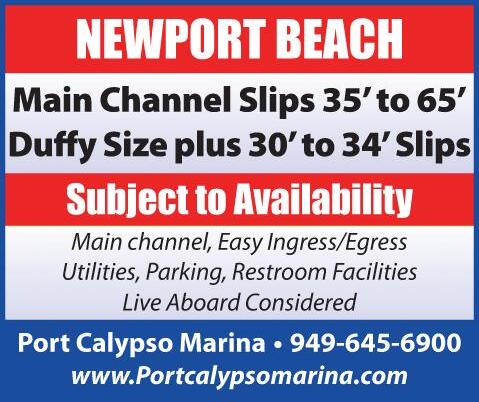
MARINACORTEZ-SANDIEGO: Stunning location,improvedamenities.10’-120’slips, endties,andsideties.30’SlipsavailableNOW. Call619-291-5985.
Youcanplaceyour Log classifiedadbycalling 800-887-1615,emailing classifieds@thelog.com, ordirectlyonlineat www.thelogclassifieds.com
NEWPORTBEACHSLIPS
AVAILABLE
MainChannel,BalboaIslandnearthe ocean.Duffys,Sailboats,orPowerboats upto68feet.Call949-688-0299forsize availabilityandanyquestions.
PIER32MARINA,SANDIEGOBAY: Callfor slipavailability619-477-3232oremail office@pier32marina.com
640SQ.FOOTGLORIETTABAY OFFICESPACEAVAILABLE nearHotelDelCoronado!1715Strand Way.SpaceBat230sqft.andSpaceCat 410sqft.Leasetogetherorseparately. Tenantmustbeengagedinamaritime relateduse.Rentalrate$4.91sq.ft/mo. modifiedgross. ContactTonyWinney,CityofCoronado,at twinney@coronado.ca.us or619-522-7335 formoreinformation.
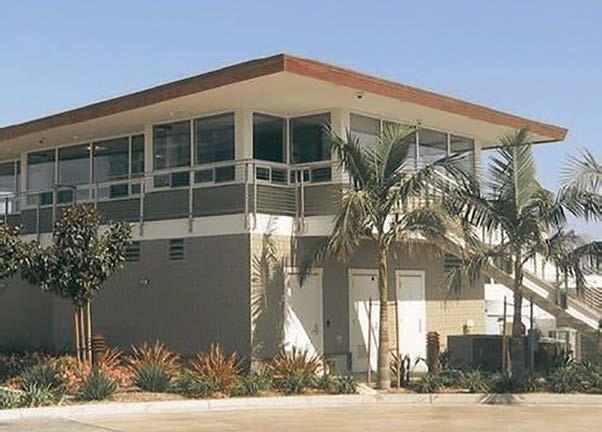

NEWFURNISHEDCHULAVISTA CASITAW/BALCONYSANDIEGO BAYVIEW
Newconstruction,deluxeRemotewall bed.Utilitiesincluded,A/Cheat, washer/dryer.Nopets/nosmoking. AvailableNOW! ESJT26@COX.NET, 619-481-2411
AYACHTSALESPERSON ISNEEDED
forPurcellYachts.Email resumeto gerry@purcellyachts.com thencal 310-701-5960.
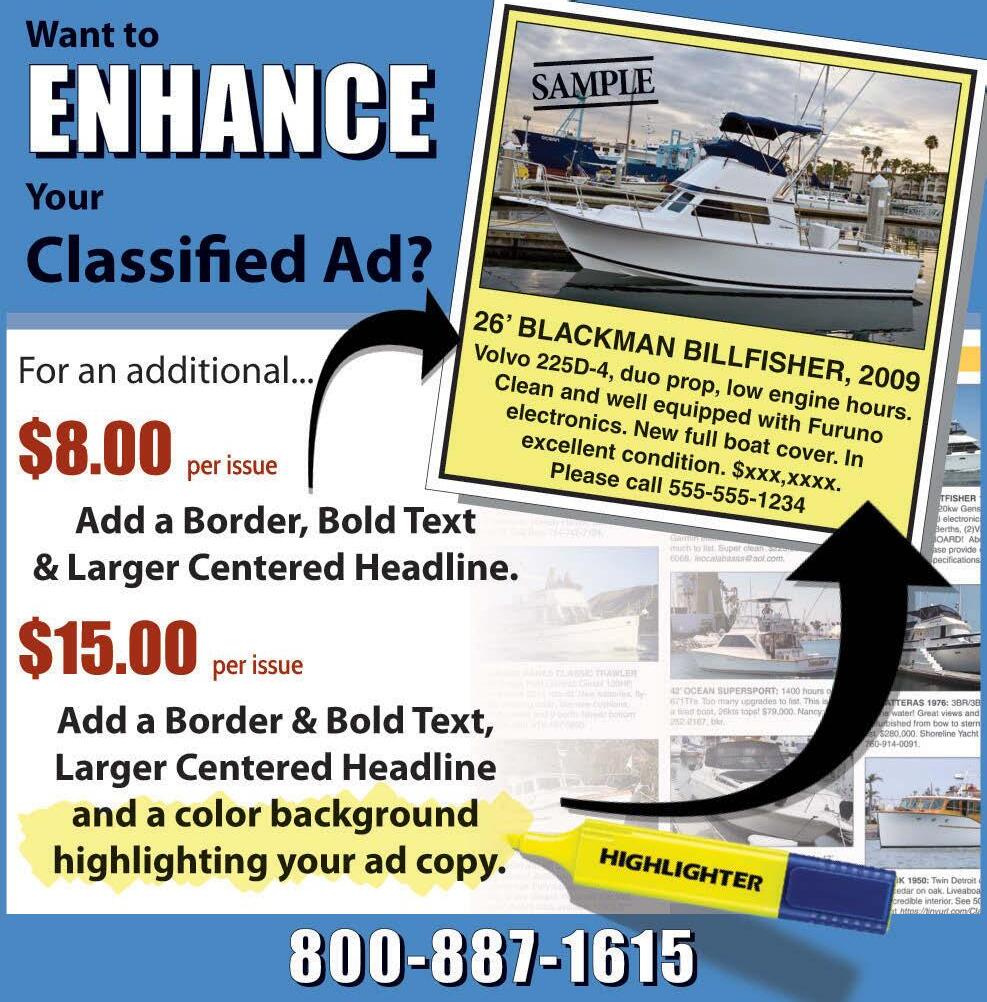
BAITBARGEATTENDANTS
Seekingdependablepersontoworkon baitbargeservinglivebaitandperform routinemaintenance.(LocationsSan DiegoBay,MissionBayandDanaPoint Harbor).Pleasevisitthefollowing linkforapplication: https://baitbarge.com/contact-us. Emailcompletedapplications to baitbarge@aol.com or fax619-477-2240.
BOATCAPTAIN&DISPATCHERNEEDED: SanPedro.USWaterTaxi.Wearelookingfora BoatCaptain.Musthave100-TonMaster (required).Formoreinformationcall310-5198230oremail jflores@watertaxius.com
BOATCREW&PHOTOGRAPHY FORCAPT.DAVE’S DanaPoint.Youarefive-star,positive, enthusiastic,passionateaboutdolphins andwhales.Greatpay,greatteam,401K matching.Experiencerequired. https://www.dolphinsafari.com/employment
HIRINGASASAILINGINSTRUCTORS: 101114USCGMMCLicensed.$500perBeginner ASA101class+$forupperlevelcourses. Sendcreds.to danm@seaforthboatrental.com, 619-223-1681.
KOZWELBOATWORKS ISHIRING!!

Wehavethefollowingpositionsopen:
•Marinetechnicians•Enginebuilder
•PartsDept.Manager/Sales
•Warehousehelp
•GeneralShophelp/apprentice
Contact: Kelliw@kozwel.com 714-432-1771
SENIORMARINEMECHANIC/TECH forbusy boatyardinNorthernSanDiego.Supervisory experiencepreferred.Experienceindisesland gasinboardmotorsrequired.Paycomensurate withexperience.ContactTed@760-722-1833.

BECOMEAMASTERMARINE SURVEYOR
Bestinbusiness.NAVTECH/US Surveyors.Marinesurveyorcourses. 1-800-245-4425, www.navsurvey.com
Commercial&recreationalavailable.

BALBOABASINYACHTCLUB seekingnew membersforCruising.PowerBoaters& SAILORSraceunderourBurgee$400.per year.FunClubhouseforevents,parties.Call KathyAnderson714-746-1341
Placeyouradtoday! CallJon@ 1-800-887-1615.
TERNTX-500XREEL: Silvercolor.Likenew. Usedonlyonce.$375.909-747-7555
$500JETSKI: YamahaFTX-140.Includes trailer.Needengine.Call619-249-2549.
GALVANIZEDCLAWANCHOR: 16.5lbs,$75. Neverused40foot3/8inchgalvanizedchain withreceipt.$150or$200forboth. 760-310-8560.
**USCGCERTIFIEDMASTER** offersPrivate MotorBoatOperationInstructionandSafety Trainingaboardyourvessel.Callforpricing information:951-642-2489,oremail billy.ellis@att.net
IBUYUSEDMARINEELECTRONICS: Text photosorcall619-962-6969.Email rickabristol@gmail.com

SUZUKIDT402-CYCLEOUTBOARD: Oil injected.Almostnew.$1,750.CallTony: 949-632-8370

2000GOODUSEDSAILS!
Listedat minneysyachtsurplus.com
Moreinfo?Email minneys@aol.com
OpenThurs-Fri-Sat.9to5&ByAppt.
HARKENWINCH: Radial60/2ST.24Vvertical motor.Allcomponents.Hasseenverylittleuse. $1,200. carl.sarnoff@verizon.net
**USCGCERTIFIEDMASTER** offersPrivateMotorBoatOperation
InstructionandSafetyTrainingaboard yourvessel.Callforpricinginformation: 951-642-2489,oremail billy.ellis@att.net

3MCUSTOMINTERIORS&CANVAS
Marineinteriordesign,fabrication. Enclosures,affordablecustommattresses, windowreplacement,exteriorandinterior cushions,carpetandcanvas.25years experience.ServingSanDiegotoLA.
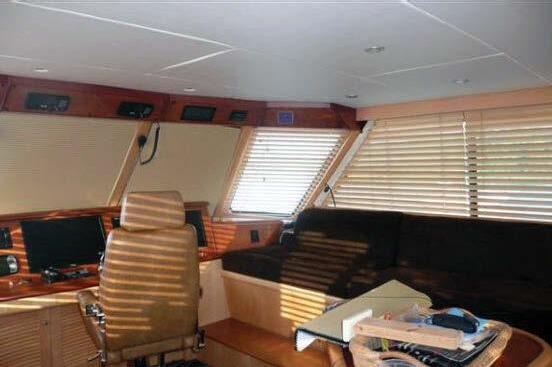
858-329-1140,949-375-1770, www.3mcanvas.com, threemcanvas@yahoo.com.
WANTEDTOBUY: Powerboats1986and newer,runningornot,upto34’inlength.We willhelpwithremovalfromyourslip.CallAlfor moreinfo:800-613-5410.

YACHTSERVICES: YachtManagement.Boat evaluationandminorrepairs.Boatoperation, safetyandmaintenancetraining.USCG Captain,ABYCCertifiedMasterTechnician. LongBeachtoDanaPoint.Paul562233-1417 oremail PAULL6@verizon.net

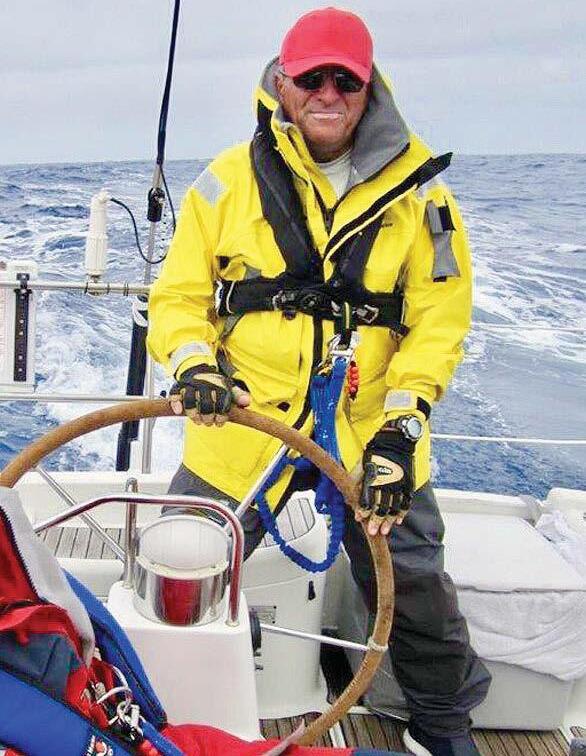
DELIVERIES,INSTRUCTION, andallother professionalCaptainservices.Sail,power. www.KeithEricson.com,619-275-3839,San DiegoSkippersAssociation
USCGCERTIFIEDCAPTAINS

Deliveries,Charters,Instruction.From AlaskatoPanama.Multipledeliveries HawaiitoCalifornia,Atlanticcrossing, Caribbean,Mediterranean. www.SanDiegoCaptains.com
CaptainNikolayAlexandrov858-531-1175 CaptainAssenAlexandrov858-531-4788
USCGLICENSED
100-TONMASTER
YACHTCHARTERS•MANAGEMENT• Deliveries•Instruction•Excursions•Sunset Sails•Fishing.CallCaptainDonGrigg: 980-722-1674oremail: captdon88@gmail.com
YACHTDELIVERY
LOCALANDWORLDWIDE
USCGLicensedCapt.MichaelElias Email: melias51@hotmail.com Call562-896-3797
WORLDWIDEVESSELDELIVERY
VesselDelivery,Relocation,Captain, ProjectandYachtManagement.Anysize, Anytonage.HighlyCompetitiveRates. 619-905-1967•619-838-8677 MarkFife@outlook.com www.AttitudeAdjustmentSailing.com

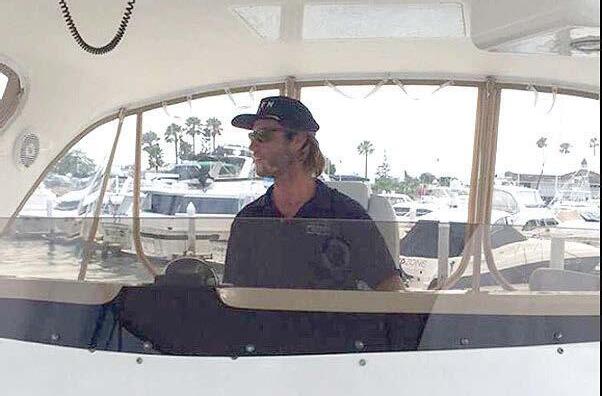
Delivery,Lessons,PrivateCaptain. Sail/Power.Over196,000documentedIntl bluewatermiles.Wellrespectedinthe marineindustry.Manydozensof references.JeffryMatzdorff:323-855-0191, earthakat@msn.com. www.offshoredeliveryskipper.com.
CAPTAINDAVE’SYACHTSERVICES: Deliveries,privateinstructionaboardyourboat, rulesofroad,navigation,electronics.Yacht managementandmaintenence.30+years experienceWestCoast,Panama,Oregon, Washington,canada,Alaska,SanJuanIslands. 619-997-2378
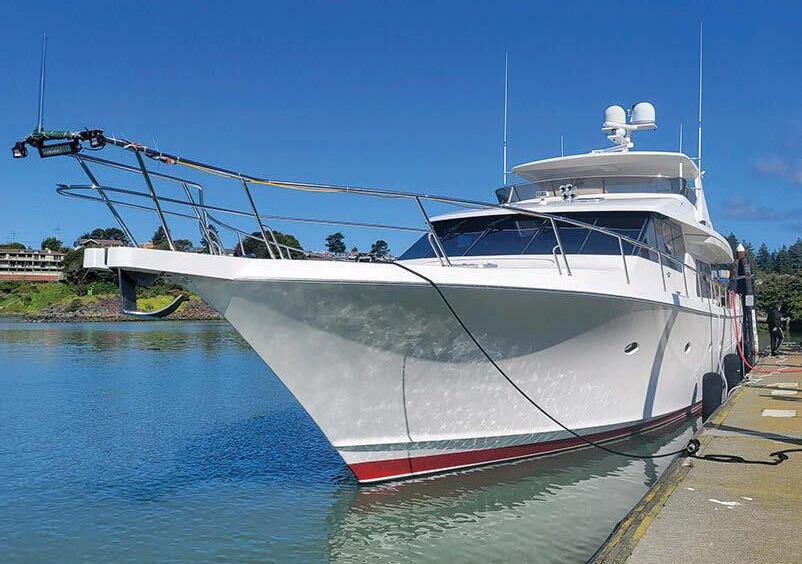
CUSTOMFABRICATEDWINDOW TREATMENTS
foranyshapewindow.Blinds,Roman shades,Rollershades,Cellularshades. 310-308-1844,888-771-5309, boatblinds@prodigy.net, www.boatblindsinternational.com






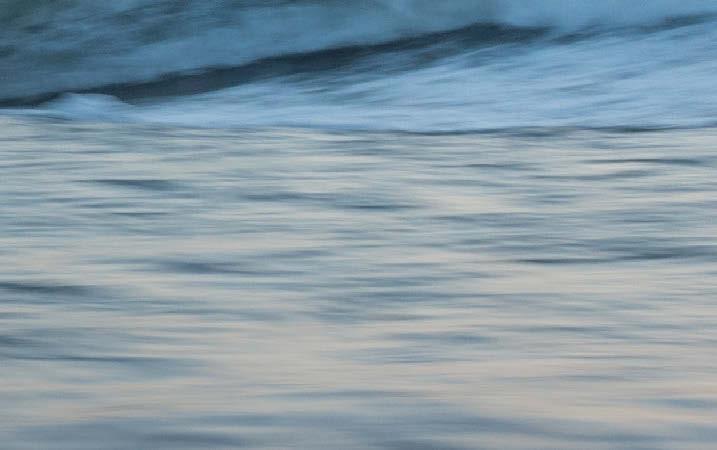

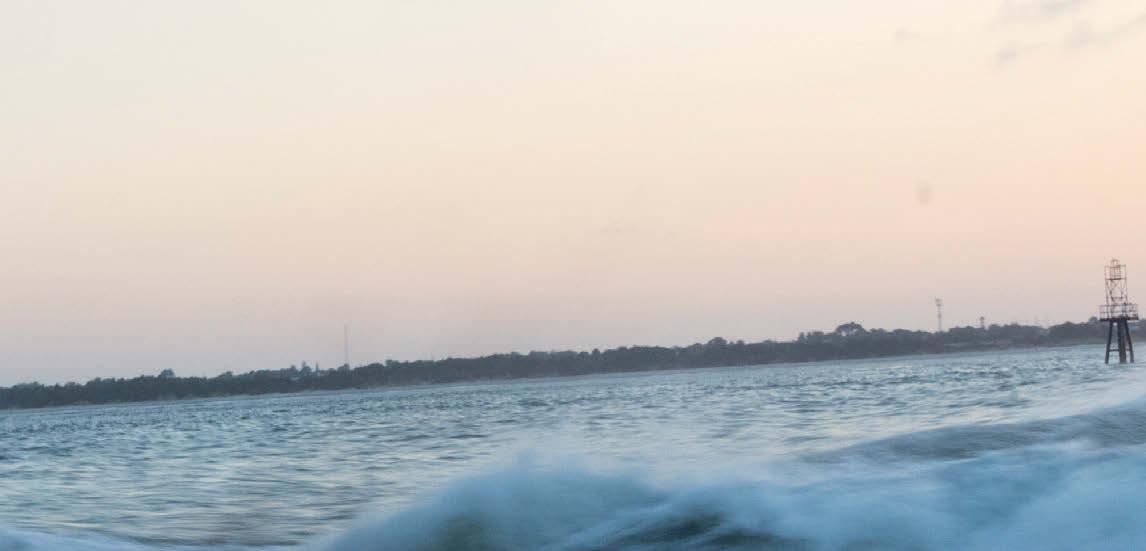



The team at Hawthorne Marine Power has a unique understanding of the wants and needs of the recreational boating owner and the engineering crews who run them. From marine engines to gen sets, power solutions and Genuine Cat® parts, Hawthorne Marine power provides a one-stop solution to keep you up and running. Plus, were backed by the global network of 500 Cat dealers, so anywhere the sea takes you, we have you covered.
